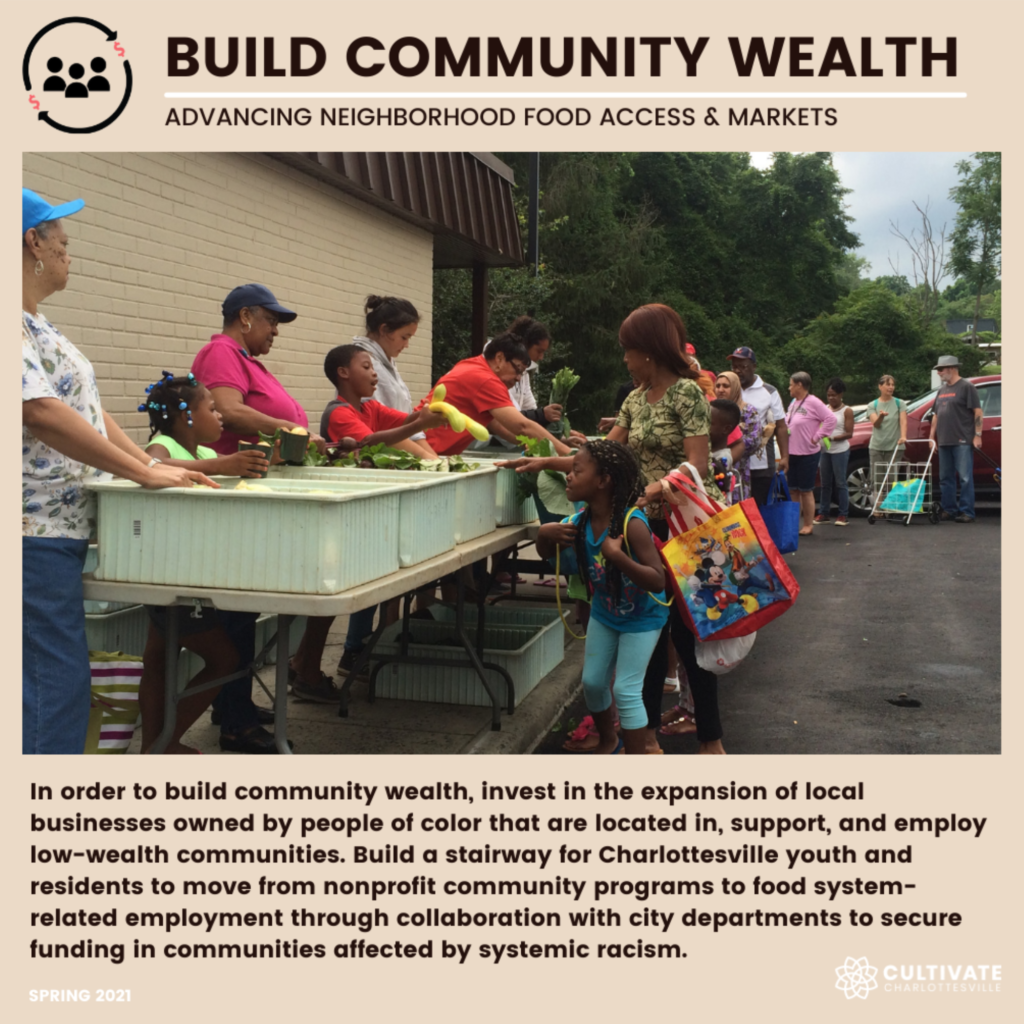
Food Justice Network Blast | October 2023, Vol. 4 Iss. 5
Build Community Wealth: Advancing Neighborhood Food Access & Markets
The economic divide in Charlottesville falls starkly along racial lines with Black and brown low-wealth families making about a half ($28,309) of the median household income ($54,029). Nationally, in 2019 Charlottesville rated in the lowest 10% of United States cities in our ability for income and social mobility. The multiple challenges and stark inequalities make it challenging for families to increase their wealth.
Investing in community wealth building opportunities provides multiple benefits across the city. In order to ignite and fund community wealth, it is critical to provide opportunities for people of color in low-wealth neighborhoods to access economic opportunities that have been limited by systemic racism. This includes expanding local food system businesses owned by people of color and providing youth and residents opportunities to thrive in food system-related position. Robust collaboration with City departments is necessary for implementation.
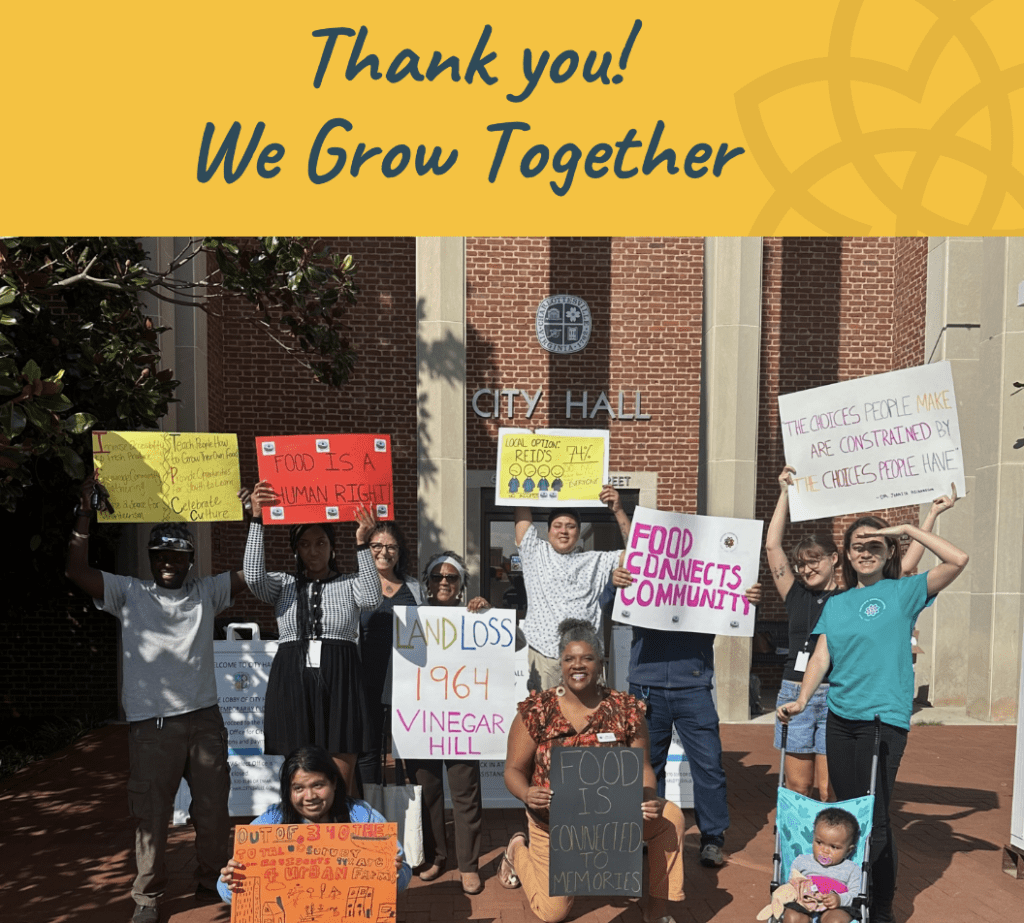
September 2023 | Volume 4
The Power to Grow
What is the power of a place? Over the past months of engaging community voice through door-to-door conversations, in-depth listening circles, community roundtable discussions, and partner gatherings, we have gleaned significant data. Overall, it tells us that 94% of residents engaged would like to see an Urban Agriculture Collective farm site at Booker T. Washington Park. This includes: 511 individuals who signed the petition, 344 residents who took the survey, 107 community members who joined the roundtable, and 51 community leaders who engaged in in-depth listening circles.
The richness behind those numbers is rooted in the stories. The memories of Black community life centered around the park. Of working together against racial discrimination to build a space of belonging. Of building power to grow a legacy. We want to express our deep appreciation for the many partners and individuals who are supporting this effort. Each signature, each survey, each letter to council, each donation, each conversation—is moving towards reclamation. In this month’s FJN newsletter profile we share snippets of a few of the stories we have heard so far! We are excited for the many more to come.
Booker T. Washington Park has many memories from my childhood of families coming together for a good cause. Having a garden to share produce and enjoy seeing the “fruits of labor” in unity is like coming full circle from our past ancestors who took great pride in this park to make a positive impact. Simona Holloway Read the full newsletter here.
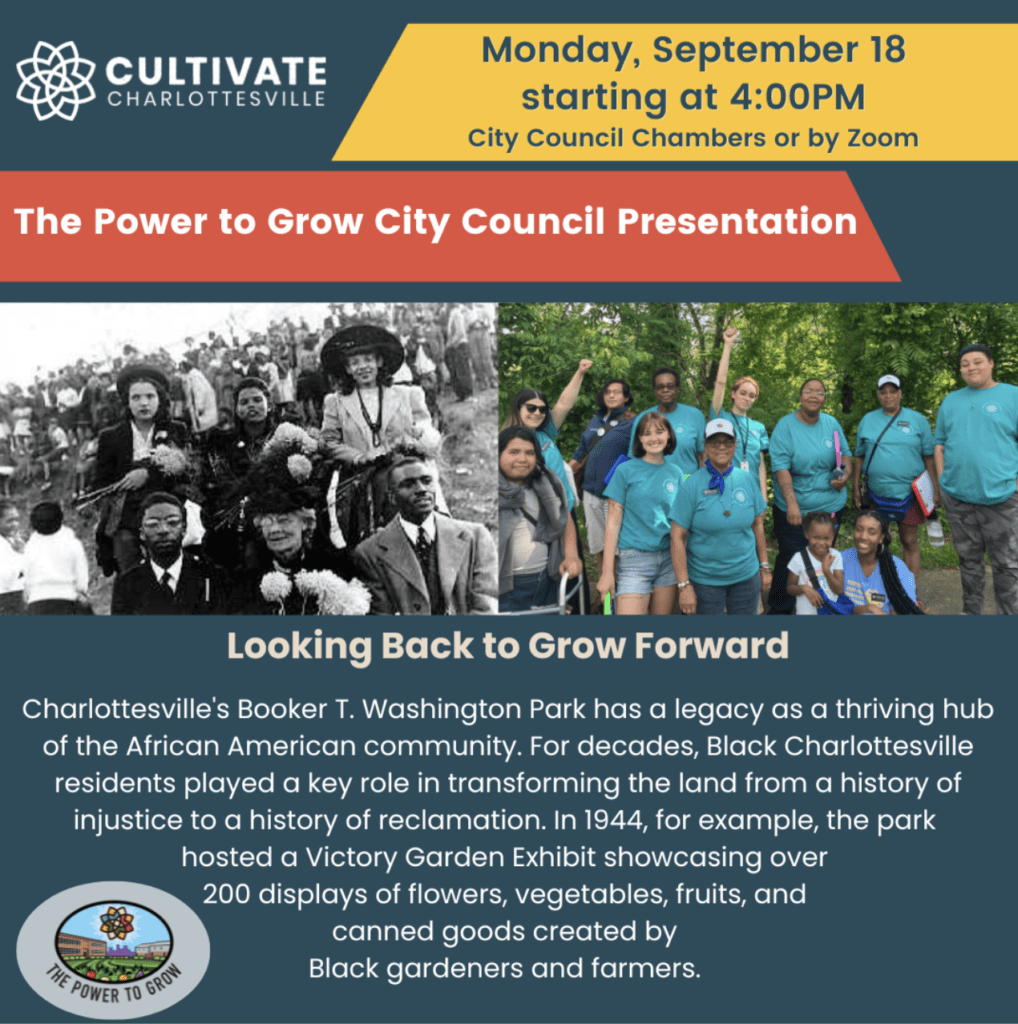
Food Justice Network Blast | September 18, 2023
On Monday, September 18 Food Justice Network Advocates, Apprentices, and community partners came together to give our annual Food Equity Initiative report to City Council.
This year was special because it included The Power to Grow community engagement report. 94% of residents expressed strong support for an Urban Agriculture Collective farm site at Booker T. Washington Park. We also received 493 signatures on the petition asking council to take the following actions.
#1. Charlottesville City Council recommends dedicating land in Booker T. Washington Park for an Urban Agriculture Collective Farm.
#2. Charlottesville City Council asks Parks and Recreation to prioritize a community design for this farm site in the upcoming P&R Strategic Plan.
#3.Charlottesville City Council recommends explicitly including food equity goals in the City’s Strategic Plan in a way that aligns with the City’s Comprehensive Plan and Food Equity Initiative Platform.
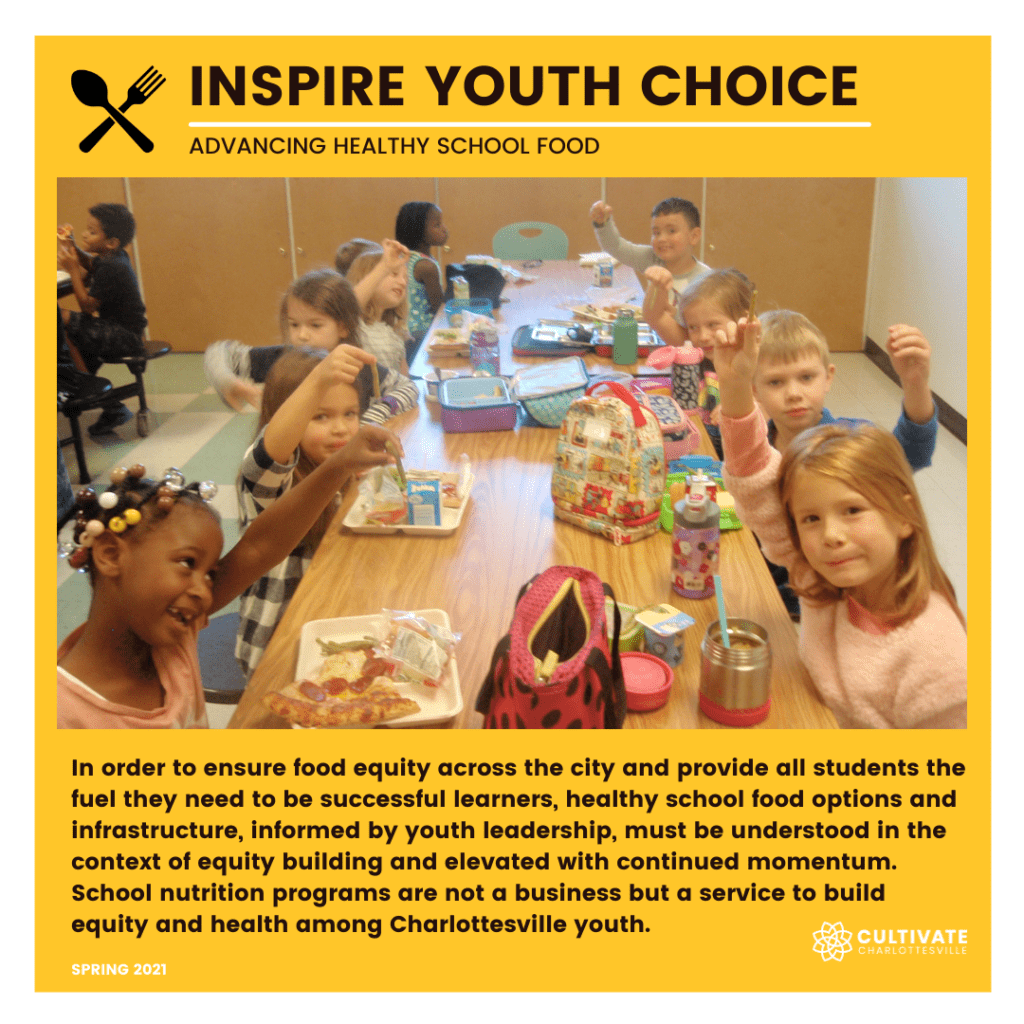
Food Justice Network Blast | August 2023, Vol. 4 Iss. 4
Inspire Youth Choice: Advancing Healthy School Food: Advancing Healthy School Food
In Charlottesville, more than half of city school youth are eligible for free and reduced-price meals and 1 in 6 city school students experience childhood food insecurity. Low-wealth students and students of color experience food insecurity at higher rates compared to their white peers. While school meal programs serve a central role in combating childhood hunger while supporting positive health and academic outcomes, students have indicated barriers to accessing school meals such as time to make it through the lunch line, unappealing food options, and smaller portions than needed. These issues are compounded by structural challenges within the school system to prepare and make available fresh, from scratch, culturally relevant foods such as limited kitchen infrastructure, inconsistent staff availability and high turnover, low wages for nutrition staff, and the diversity of the Charlottesville City School (CCS) student population and cultural food needs.
In order to ensure food equity across the city and provide all students the fuel needed to be successful learners, healthy school food options and infrastructure, informed by youth leadership, must be understood in the context of equity building and elevated with continued momentum. School nutrition programs are not a business but a service to build equity and health among Charlottesville youth.
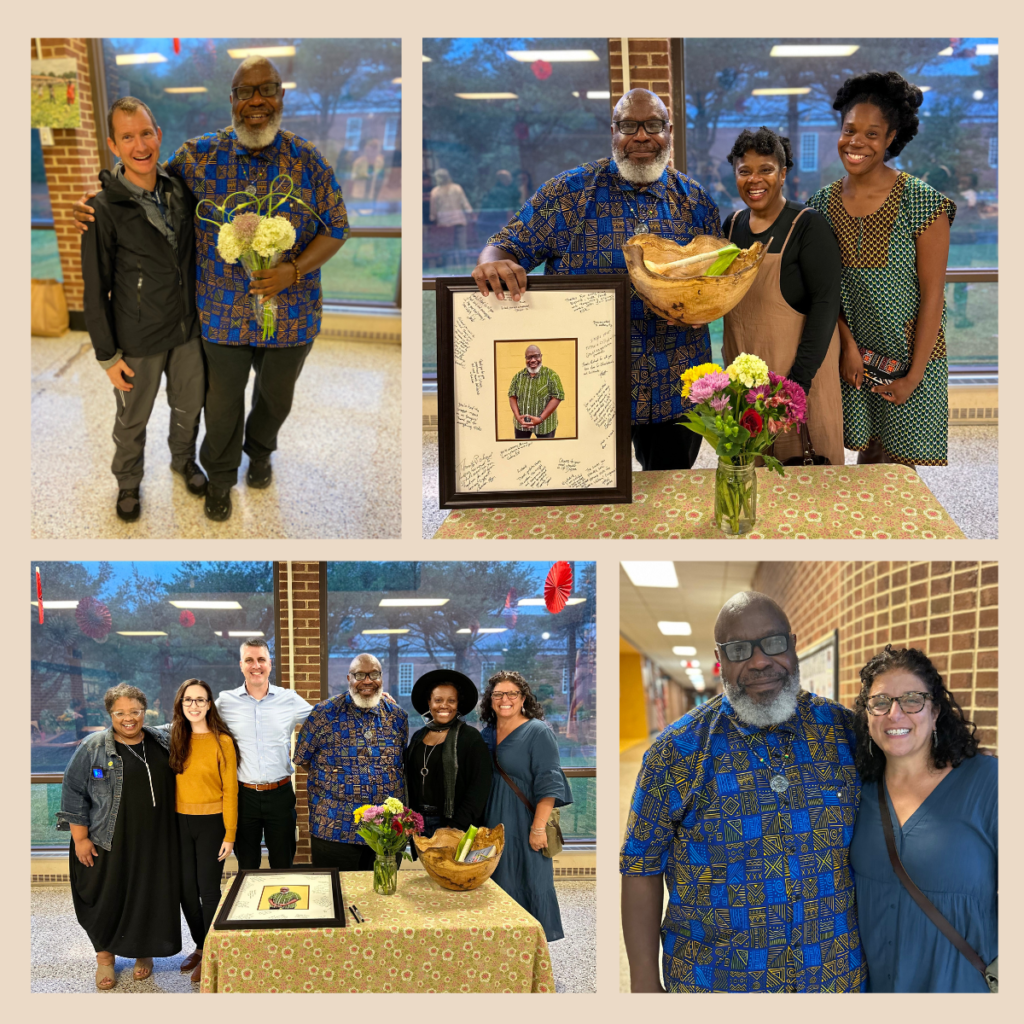
August 2023, Volume 4
At the end of June, after five years with Cultivate Charlottesville, Richard Morris turned in his trowel. A room full of folks joined us to celebrate his many accomplishments with the organization and wish him a fond farewell. On the first of July, Aleen Carey, after many years on the Board of City Schoolyard Garden and three years as outreach and resource program director, stepped into leadership as co-executive director alongside Jeanette Abi-Nader.
Even though a different person is sharing key responsibilities, the growing, sharing, and advocating at the core of Cultivate’s food justice mission will remain the same. We are still passionate about experiential garden learning. We are still listening to neighbors about what kind of produce they would like to pick up at Community Market Days. We are still amplifying the voice and choice of youth and community members around food equity.
And, SURPRISE, Richard will stick around as a consultant to work on The Power to Grow urban agriculture campaign (see Advocating for Agriculture below) he has been stewarding for years (you didn’t think we were just going to let him retire to the country, did you?).
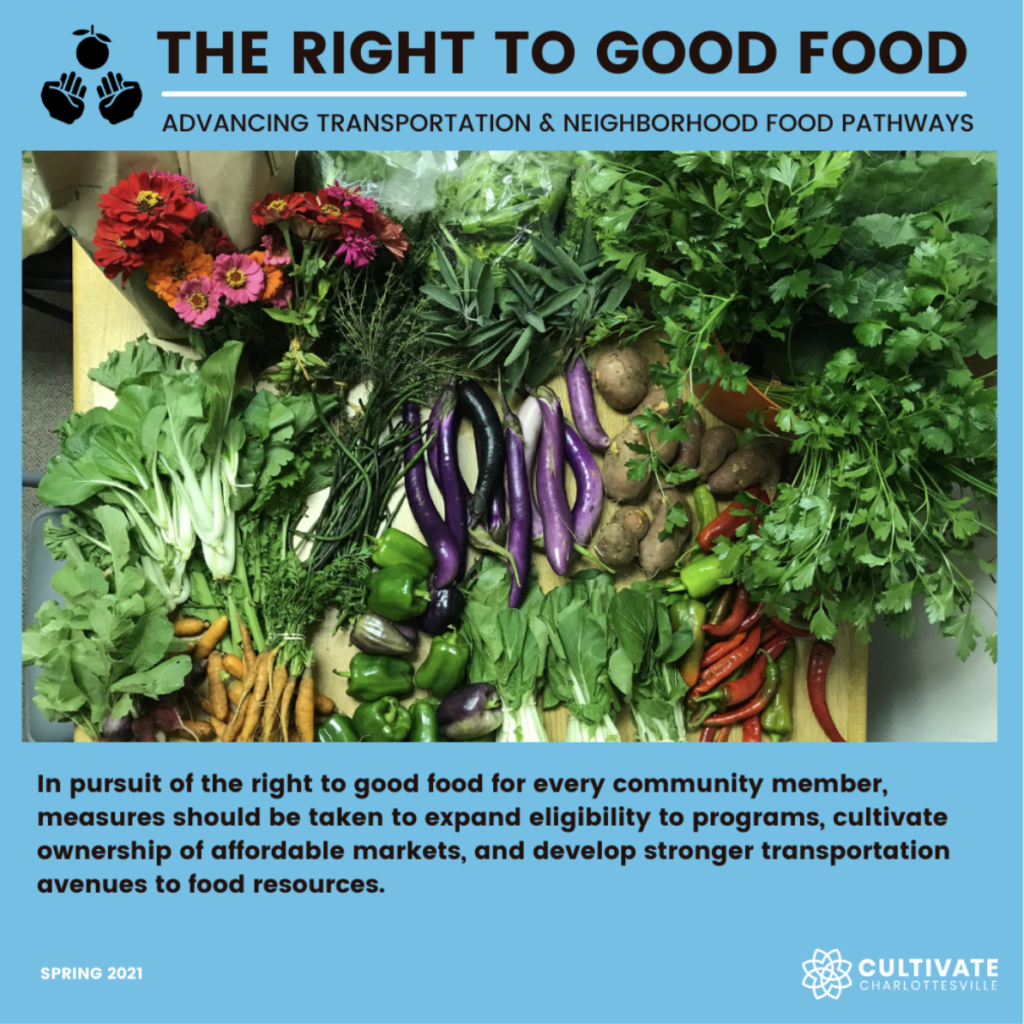
Food Justice Network Blast | June 2023, Vol. 4 Iss. 3
The Right to Good Food: Advancing Transportation & Neighborhood Food Pathways
While Charlottesville is regarded as a foodie town nestled in the abundance of sustainable cultivated farms, the right to good food is not equally realized across our city. Prior to the pandemic, 1 in 6 residents faced challenges acquiring enough good and nutritious food for their families. Across the Blue Ridge Health District, health outcomes continue to draw stark lines by race. In our City, inequitable access to food can be traced back to neighborhoods, demonstrating that not every community was developed fairly in terms of transportation, grocery store access or affordable community markets, and economic opportunity. In addition, individuals reentering society face barriers with decreased access to programs like SNAP and WIC, as well as housing assistance, further exacerbating inequities we see today across race and class.
In pursuit of the right to good food for every community member, the Food Justice Network believes measures should be taken to expand eligibility to programs, cultivate ownership of affordable markets, and develop stronger transportation avenues to food resources.
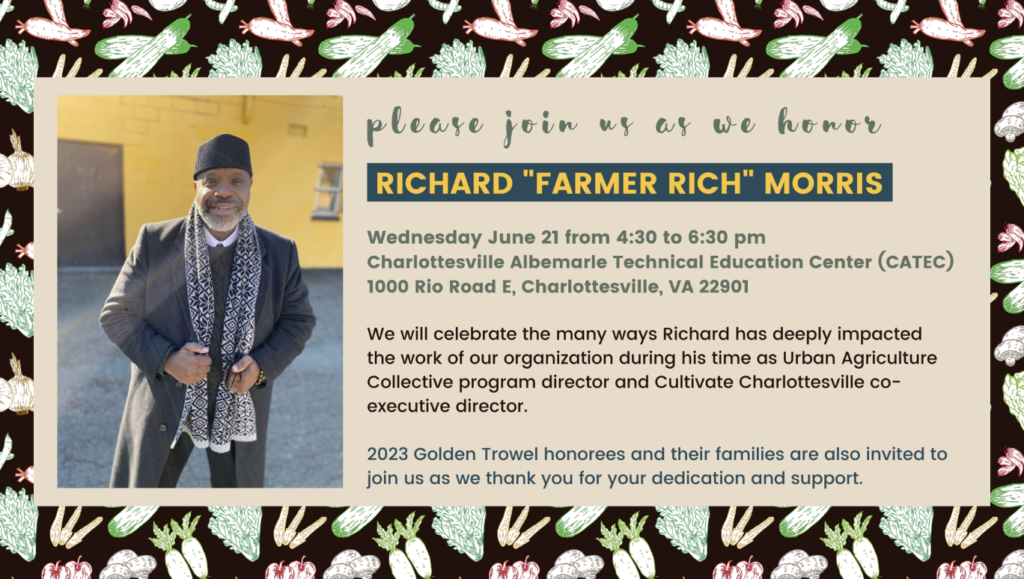
Summer 2023, Volume 4
Every year, the turning of the seasons brings with it the promise of abundance. For Cultivate Charlottesville, 2023 is our season of change. Over the next year, Richard and Jeanette, our dynamic duo co-executive directors, will be passing the trowel to new leadership. Richard Morris will be leaving his position at the end of June, while Jeanette Abi-Nader will be staying on through December to ensure a smooth transition. We are excited to announce that Aleen Carey will be stepping into leadership as one of Cultivate’s new co-executive directors on July 1.
Aleen has deep roots in the Charlottesville community. She moved here in high school, served as a teacher, and has experience across numerous Charlottesville nonprofits. Her journey with Cultivate began 10 years ago as a Board member. For 5 years, she served ably as our Board Chair. In 2020, she joined our staff as our first Outreach and Resource Program Director. Her commitment to Cultivate, to the community, and to our shared work is as evident as her dynamic skills.
Aleen is looking forward to leading the next phase of our transformational leadership model and the exciting changes ahead in Charlottesville’s food equity landscape. She remains focused on our mission of engaging “youth and community in building equitable, sustainable food systems through garden-based experiential learning, growing and sharing healthy food, amplifying community leaders, and advocating for food justice.”
“It has been a rewarding experience to see the growth of City Schoolyard Garden from our first garden at Buford Middle Schools to Cultivate Charlottesville’s integrated approach to building a healthy and just food system personally, in community, and across systems and structures. I’m so excited to work with Aleen and our amazing staff and board through this transition.” – Jeanette Abi-Nader
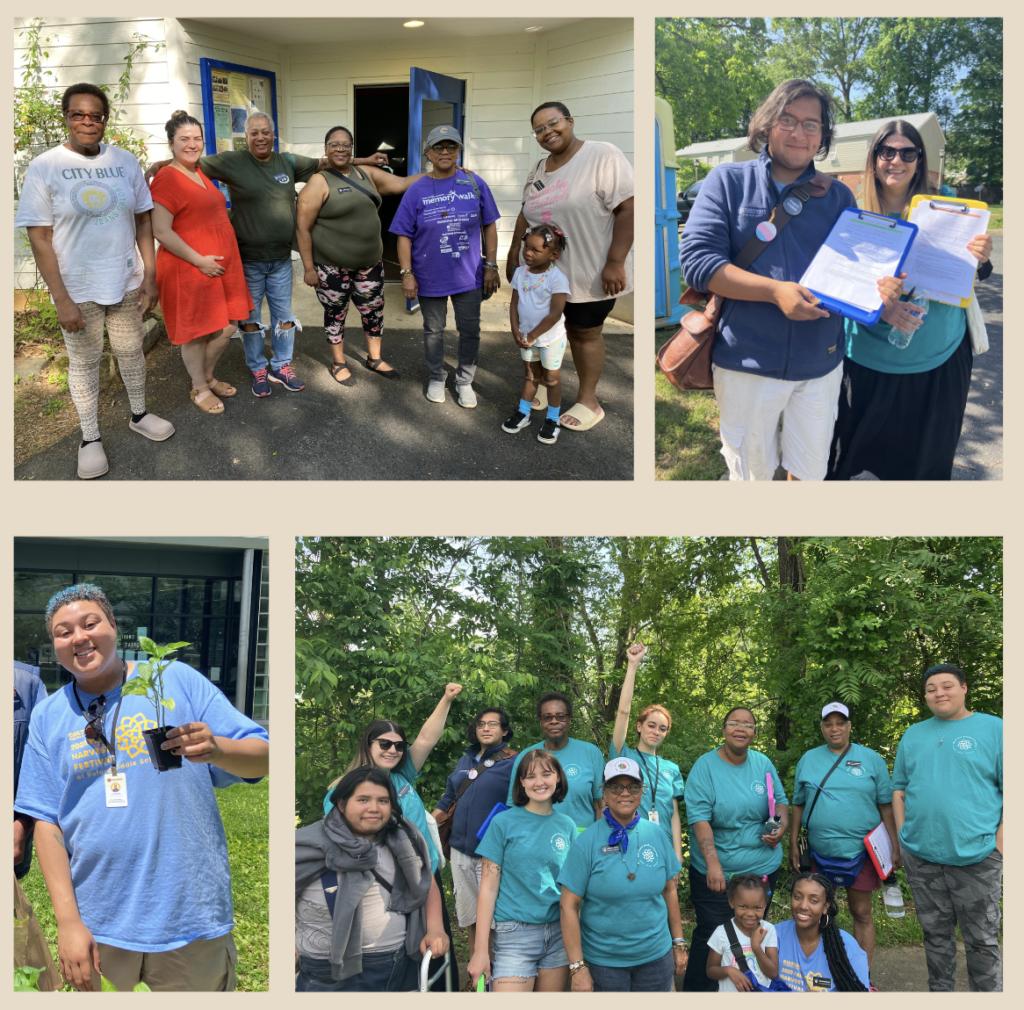
June 2023, Volume 4
At Cultivate Charlottesville, we talk about what it means to be a transformational leader. How we can step into leadership that builds equity by what we do, how we show up, and how we analyze the landscape of systems and structures. Over the past few months we have seen two paid cohorts of community members stepping into leadership and advocacy around urban agriculture in our city. The Community Advocate 2023 cohort and our new Food Justice Apprentice cohort is joining together to connect with neighbors and glean community feedback. This effort, two years in the making, is one way we are centering the voices and choices of community.
While this grassroots work is happening, door to door, we are also paying attention to the national community of food justice folks. As a core member and 2021 School of Political Leadership participant with HEAL Food Alliance, we are learning about and advocating for a just farm bill. We encourage you to join us in this critical quest. The Farm Bill is about a LOT more than farming. It shapes how we provide meals for school students, food benefits for mothers and children, and so much more. See below for ways you can get involved and advocate!
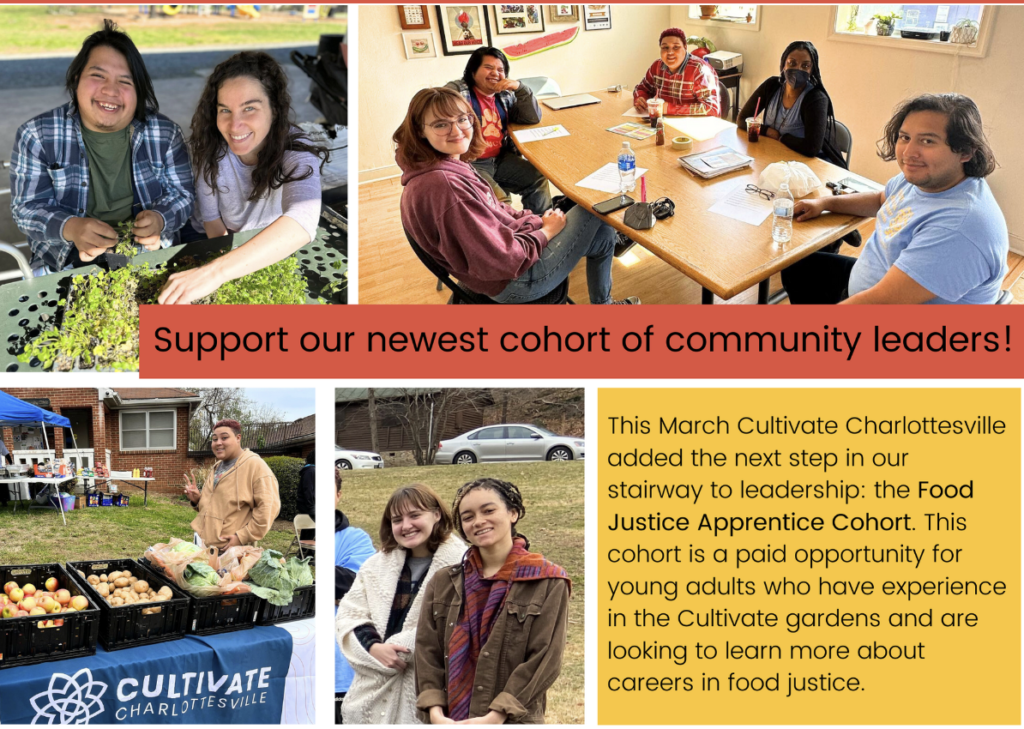
May 2023, Volume 4
This March Cultivate Charlottesville added the next step in our stairway to leadership: the Food Justice Apprentice Cohort. This cohort is a paid opportunity for young adults who have experience in the Cultivate gardens and are looking to learn more about careers in food justice. We are asking for your support to help fund the new Food Justice Apprentice Community Engagement Cohort as part of our stairway to leadership. Each of five apprentices receive $15,000/seven months + plus a lot more!
Food Justice Network Apprentices: Work alongside mentors in each of our core programs: City Schoolyard Garden, Urban Agriculture Collective, Food Justice Network, and Integrated Systems and Strategies; Receive on-the-job training in multiple skill areas; Gain professional skills, insights, and capacity building; Lead special projects with their own budgets – as individuals and as a cohort; Deepen their knowledge around systemic issues in our food system and how those issues impact the community. This new cohort would not be possible without your support.
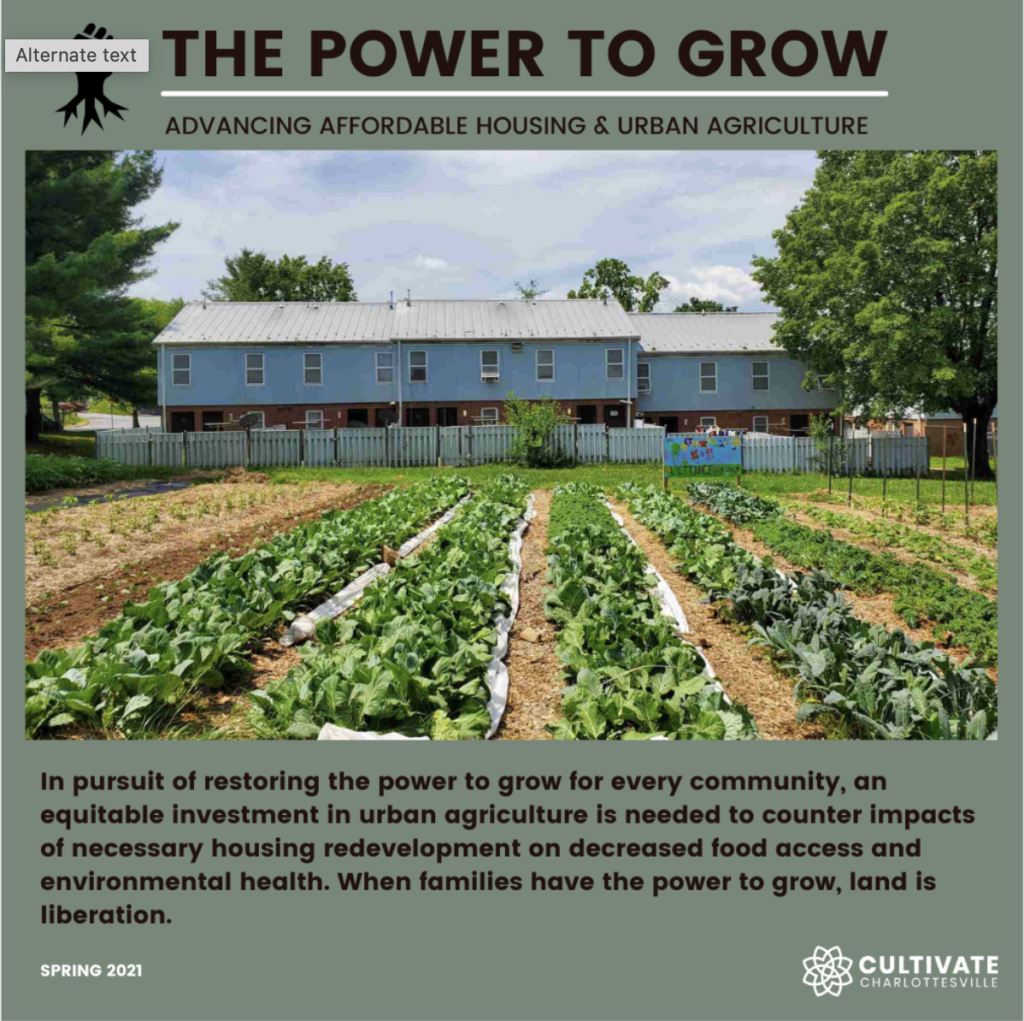
Food Justice Network Blast | April 2023, Vol. 4 Iss. 2
The Power to Grow: Advancing Affordable Housing & Urban Agriculture
The power to grow food for the health and nutritional wellbeing of one’s family is a power not equally distributed across the city. Black and brown, low-wealth neighborhoods carry the increased burden of choosing between good housing and land to grow sparking mind, body, and social health. Currently, three key urban farms ushered forth by residents themselves as an effort to create fresh and free produce for their families and neighbors have been destroyed to make room for much needed affordable housing.
At its height, these farms totaling an acre in the city’s urban center, produced 17,000 pounds of produce for 350 families in the Friendship Court, South First Street, 6th Street, Crescent Halls, Midway Manor, Riverside and Westhaven neighborhoods. In addition to produce distributed at weekly markets, these growing communities bolstered some of the most environmentally sustainable practices managing storm water runoff, building soil health, fostering natural pollinator habitats, and growing orchards while cleaning the air and capturing carbon.
In pursuit of restoring the power to grow for every community, the Food Justice Network believes an equitable investment in urban agriculture is needed to counter impacts of necessary housing redevelopment on decreased food access and environmental health. When families have the power to grow, land is liberation.
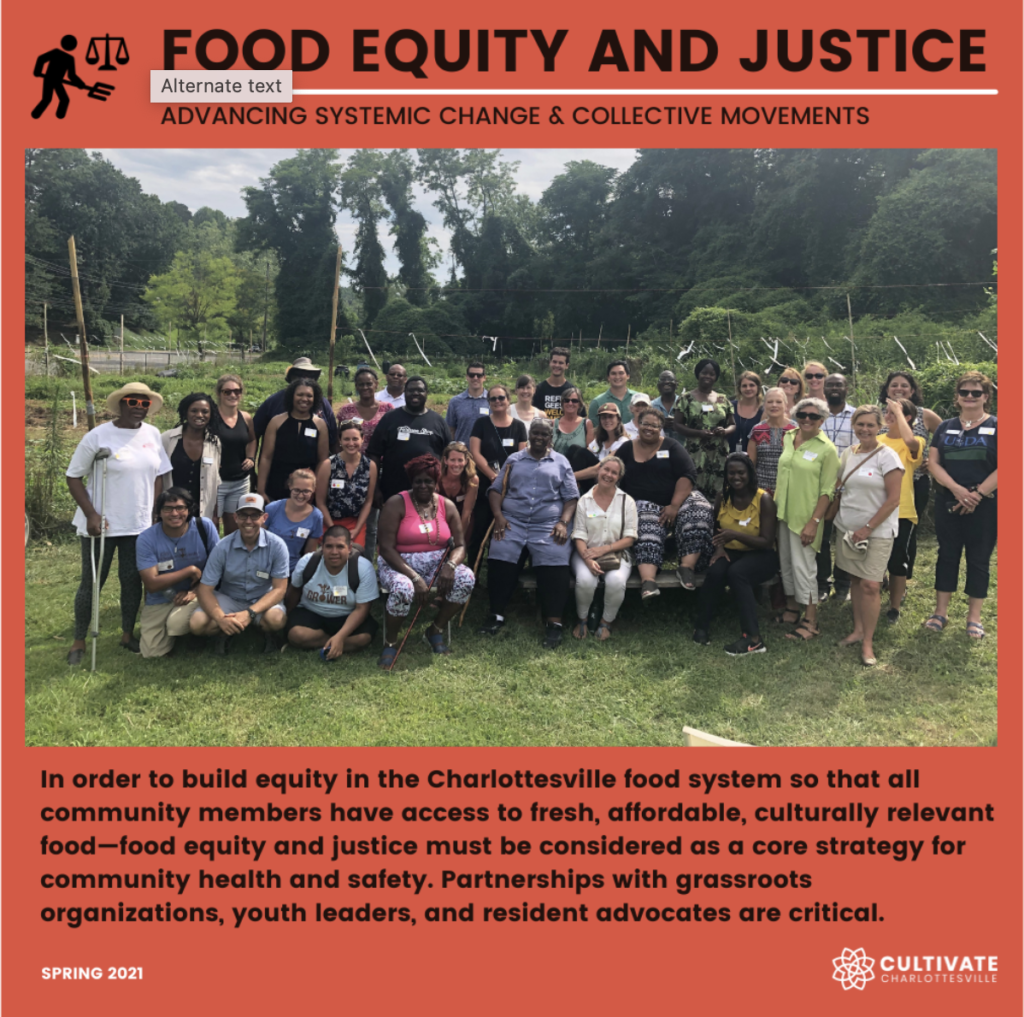
Food Justice Network Blast | February 2023, Vol. 4 Iss. 1
Food Equity and Justice: Advancing Systemic Change & Collective Movements
Food equity and justice practices are foundational throughout this policy platform and reinforce food as a human right. Each recommended action emerged out of prioritizing community members voices and choices and aims to impact long-term systemic change. While some cities establish food policy councils to carry out Food Equity Initiative type work, Charlottesville has a unique and dynamic partnership with Cultivate Charlottesville Food Justice Network. Together we leveraged the power of public and private partnerships to rapidly respond to crisis in the face of the pandemic. Supporting collective movements that uplift community voice and leadership through partnership and collaboration with grassroots organizations, youth leaders and resident advocates has been a foundation of systemic change for our city.
In order to build equity in the Charlottesville food system so that all community members have access to fresh, affordable, culturally relevant food—food equity and justice must be considered as a core strategy for community health and safety. Partnerships with grassroots organizations, youth leaders, and resident advocates are critical.
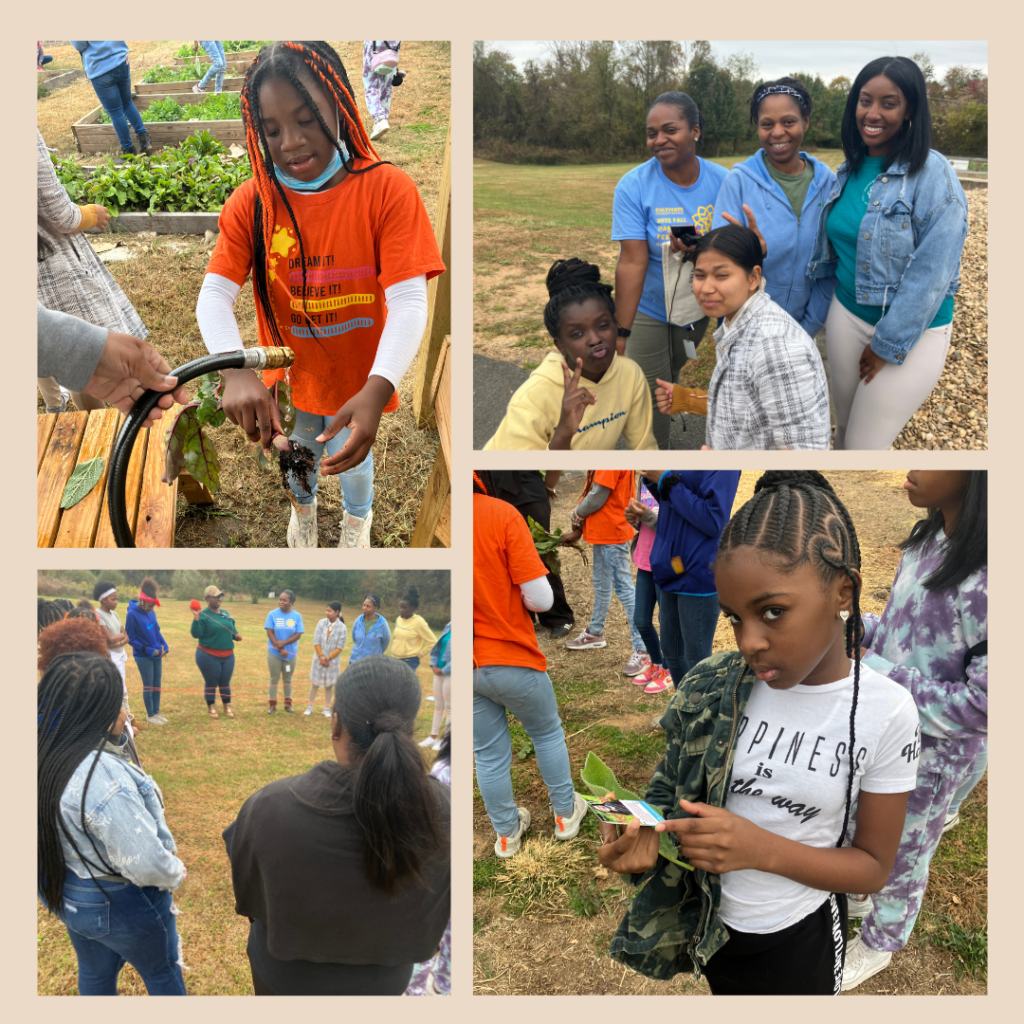
November 2022, Vol. 3 Iss. 10
Being from a Native American family, conflicting feelings surrounding this time of year can be overwhelming. In my culture wealth is not measured by how much we can accumulate, but how much we can give away to others. Being surrounded by this amazing team who embodies these values is something that I am indeed thankful for, and am gratified by the work we do TOGETHER selflessly for others. I hope that you can find a moment of stillness in your each day to reflect on what you are grateful for, and that it carries you through your week.
– Amyrose Foll, Urban Agricuture Collective Program Director
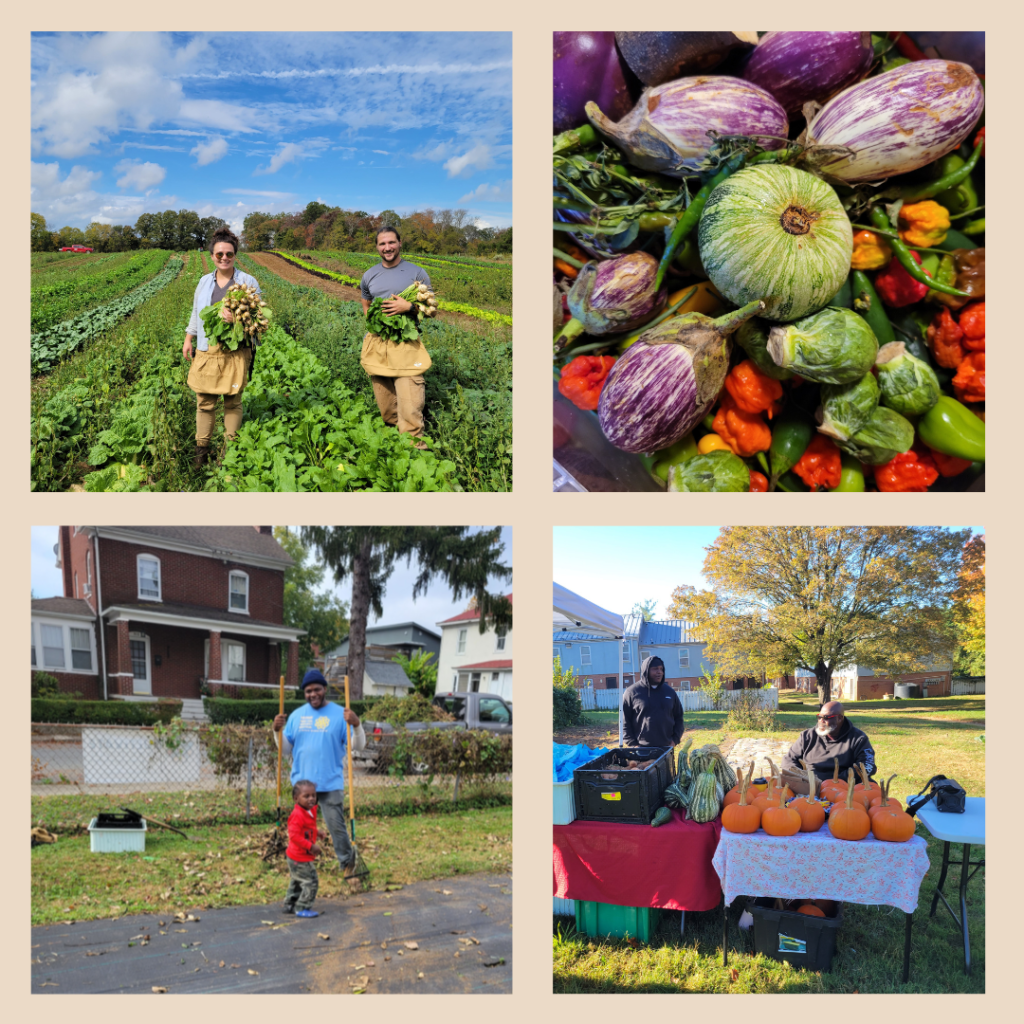
October 2022, Vol. 3 Iss. 9
October was a BIG month! There was farm to school. Community Climate Collaborative (C3) honored Cultivate with an award. The UAC team harvested sweet SO MANY potatoes. CSG presented at a state conference. We welcomed three new people to our staff.
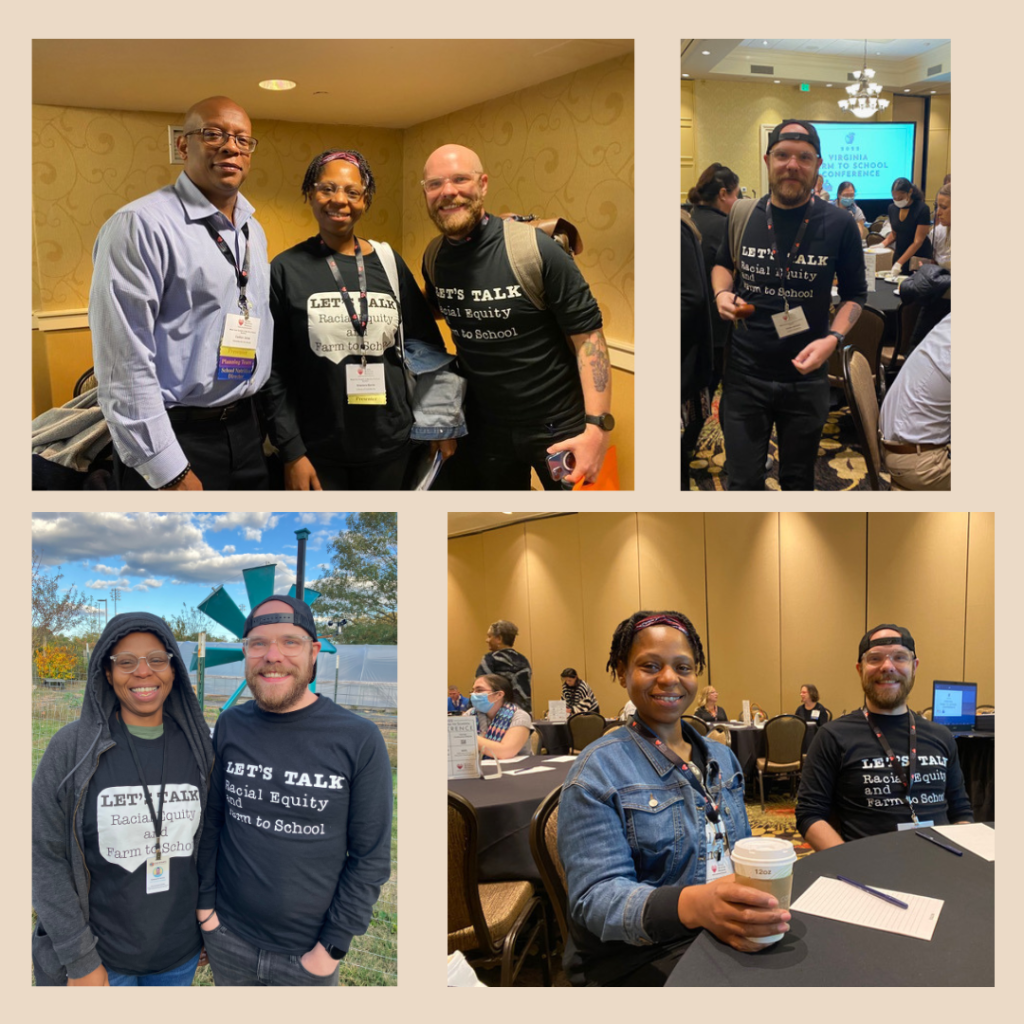
Farm to School 2022, Special Edition
Over the past few years, Cultivate has been collaborating with VDOE F2S by sharing models of our Harvest of the Month work, presenting at Virginia Farm to School conferences, and participating in proposal reviews. This year, however, as the state began to roll out their final version of the VA F2S Toolkit, we were asked to edit our profile; requested edits included taking out all of our references to race and equity. Why this shift to exclude direct recognition of the role of race and equity in farm-to-school work? Well, on the first day of his administration, Virginia’s new Governor Glenn Youngkin signed Executive Order Number One addressing so-called Divisive Concepts.
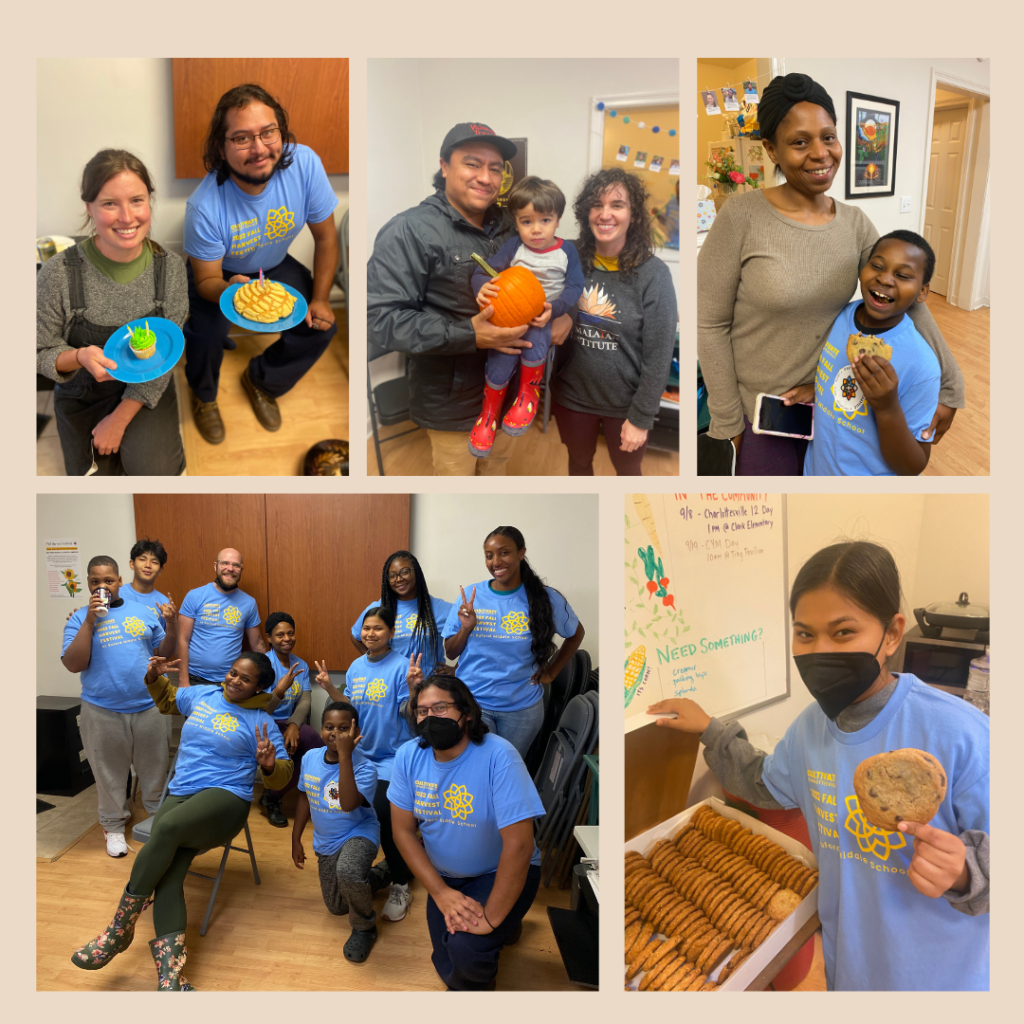
September 2022, Vol. 3 Iss. 7
Although we were sad to have to cancel our Harvest Festival at Buford Middle School, we were glad to still celebrate with our families and donate prepared food to our friends at The Haven. One of the reasons we were eager to see everyone, was because of the scheduled reconfiguration at Buford—as of right now, construction will begin next year. We are committed to coming together again before the site at Buford—original City Schoolyard Garden—is relocated. Stay tuned for a reschedule date in spring 2023.
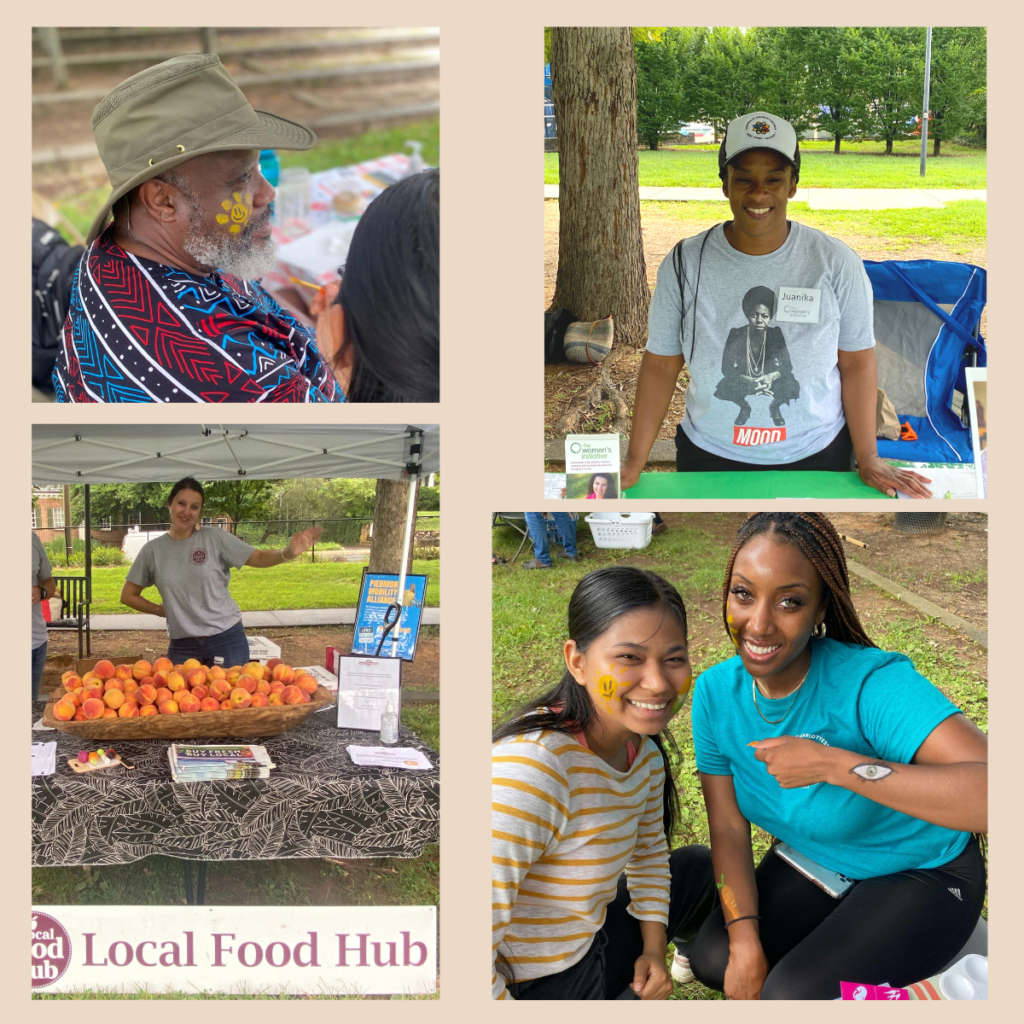
Summer 2022, Vol. 3 Iss. 6
It’s been a busy busy summer! Our latest cohort of food justice interns have spent 6 weeks engaging in daily garden care, building relationships, engaging in conversations about healthy school meals, having food justice conversations, and attending community events. Meanwhile, the UAC team has already hosted 39 markets across the city–distributing 4,000 lbs of fresh, garden produce to community members. Not to mention all of the community events our team has been attending!
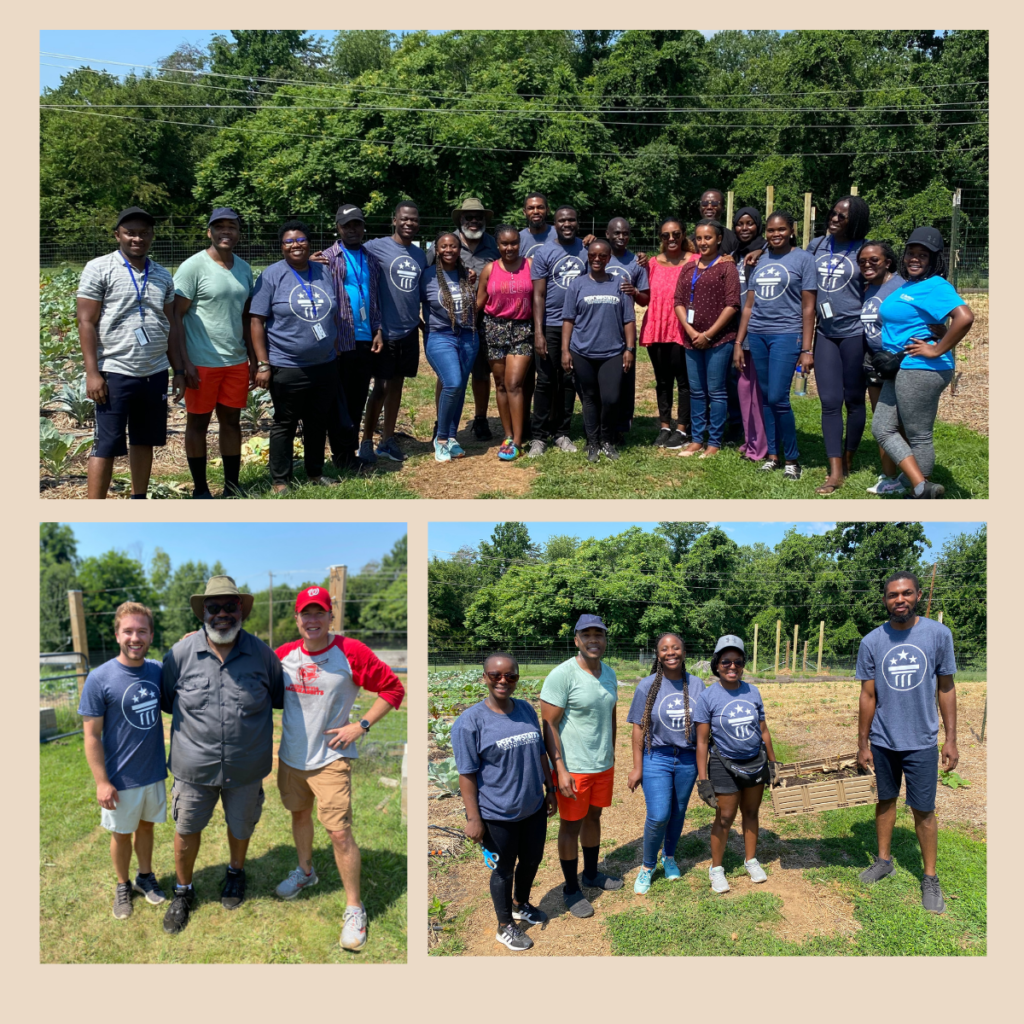
June 2022, Vol. 3 Iss. 5
Another academic year has come to an end, but it’s just the beginning of a busy summer for Cultivate. With the newest youth food justices interns cooking up veggies straight from the garden, many different groups volunteering in the school gardens and farm plots, and Community Market Days in full swing—June is anything but a vacation!
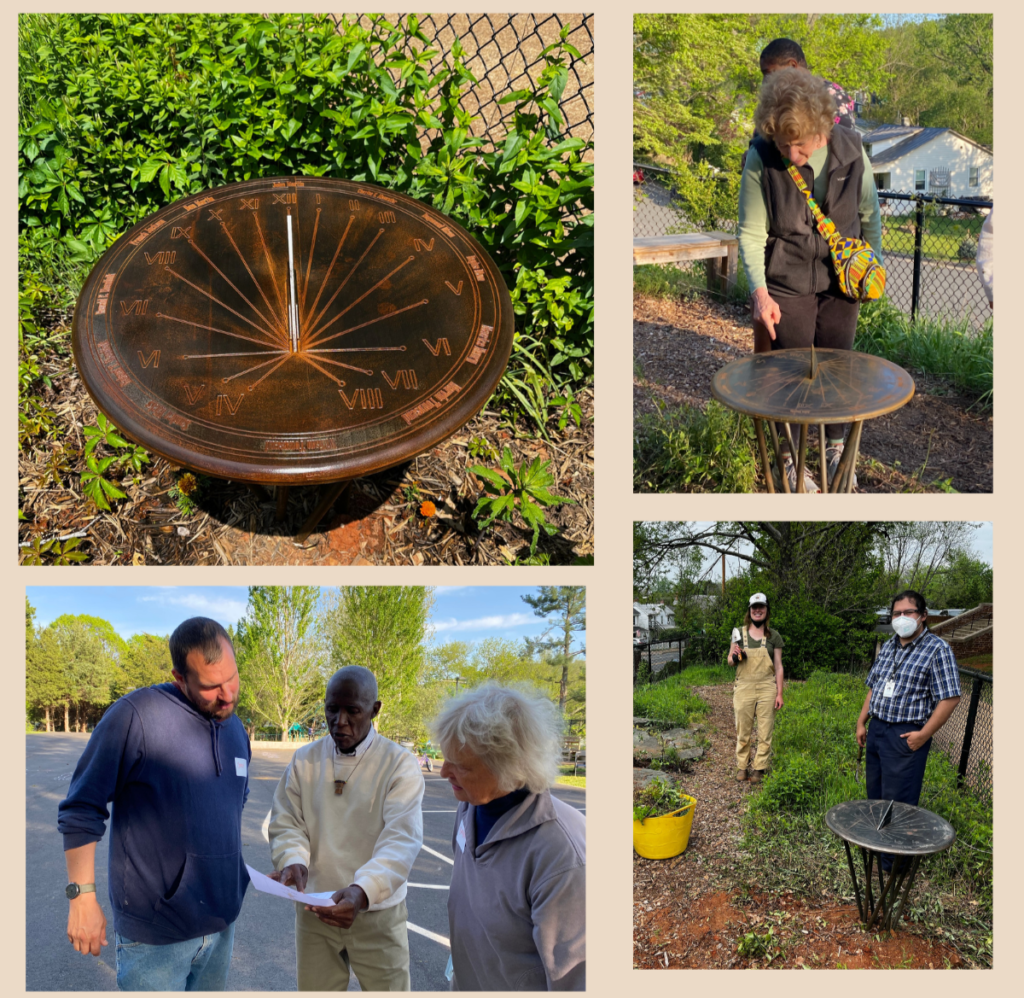
April & May 2022, Vol. 3 Iss. 4
We’ve been busy at Cultivate this spring! At the end of April we practiced Healing in the Garden with The Women’s Initiative, watched the Building Trades students complete raised beds at the CATEC farm plot, installed the Charlottesville Twelve sundial at Clark Elementary, hosted a BINGO fundraiser, and celebrated the volunteers, partners, & sponsors that support our work. That was all in one week.
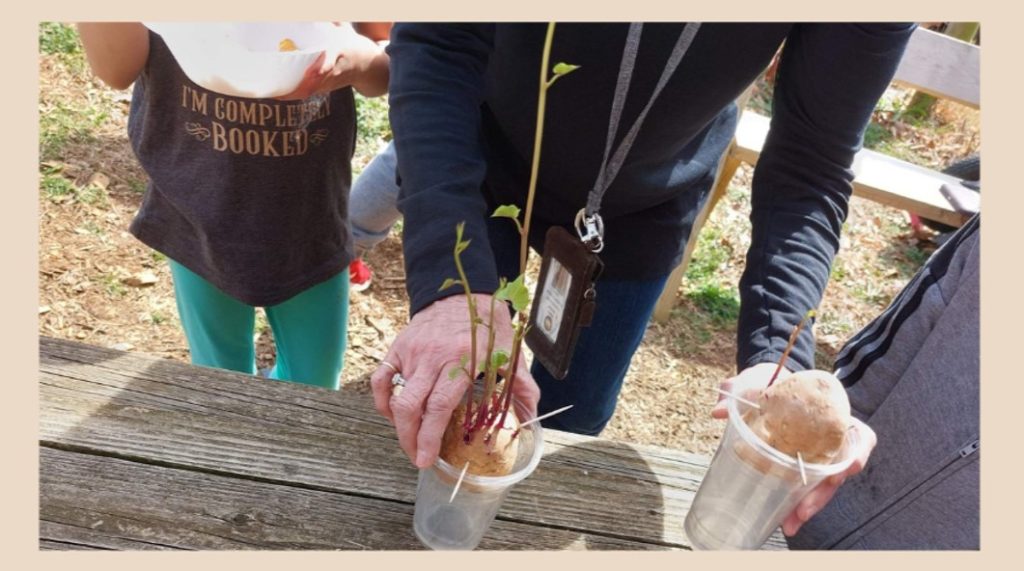
March 2022, Vol. 3 Iss. 3
March came in like a lamb with sunny skies heralding spring weather, but it went out like a lion with a tornado warning and wild winds. That’s not the only weather folklore The Farmers’ Almanac highlights related to the third month of the year. “So many mists in March you see, so many frosts in May will be” and “As it rains in March, so it rains in June,” will have us waiting for another few months to find out how the weather affects our 2022 harvests.
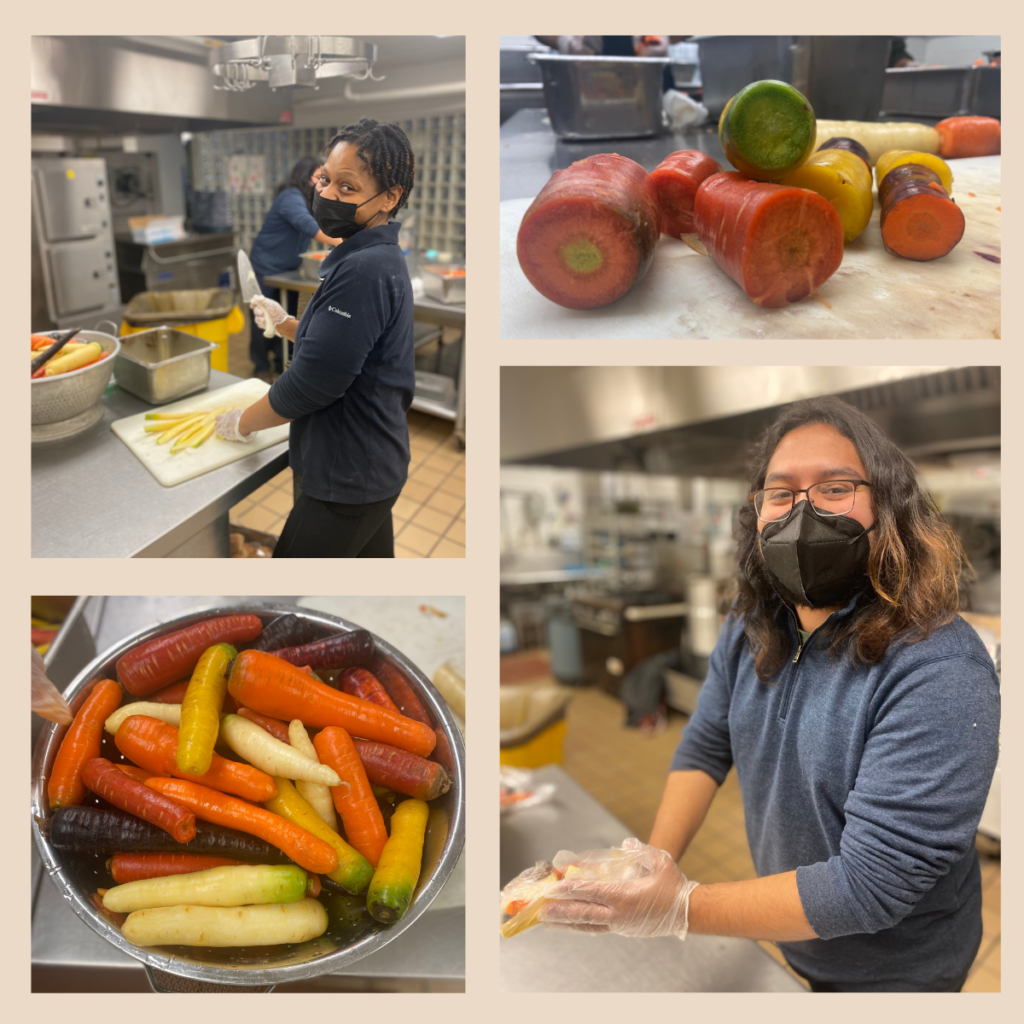
February 2022, Vol. 3 Iss. 2
Cultivate is over-the-moon thrilled to be a new CORE MEMBER of HEAL Food Alliance! City Schoolyard Garden, Food Justice Network, and Urban Agriculture Collective came together to form Cultivate Charlottesville with a mission of integrating the approach each of those programs had to building a healthy and just food system. HEAL Food Alliance shares that vision saying, “No single individual, organization, or sector can transform systems in isolation. We believe that true transformation requires diverse skills, roles, and resources— and, it requires organizing together for real change.” Cultivate is proud to be one of the HEAL member organizations “building collective power to transform our food and farm systems.”
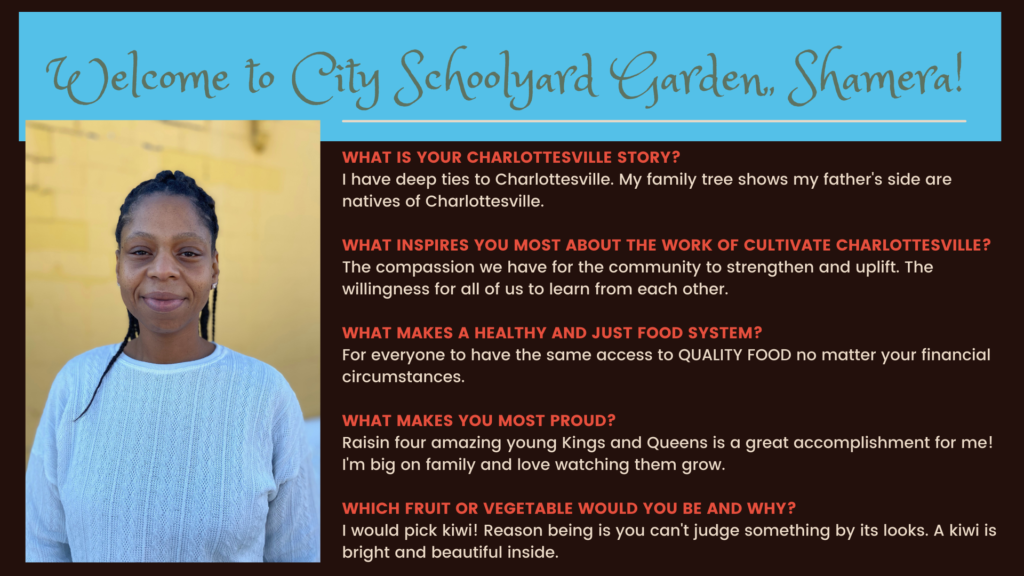
January 2022, Vol. 3 Iss. 1
It’s a new year! We’re certainly excited to welcome new Cultivate team member Shamera Banks as Farm to School Coordinator with our City Schoolyard Garden program. We’re also pretty fired up about two urban farm spaces that will see us planting and harvesting again in 2022. This will be our first full season at Charlottesville-Albemarle Technical Education Center (CATEC), where we have already laid roots of collaboration with the students and faculty. In addition, we will be working the land again on West Street (behind the Region Ten building) that has been stewarded by the International Rescue Committee (IRC) New Roots farmers for the last number of years.
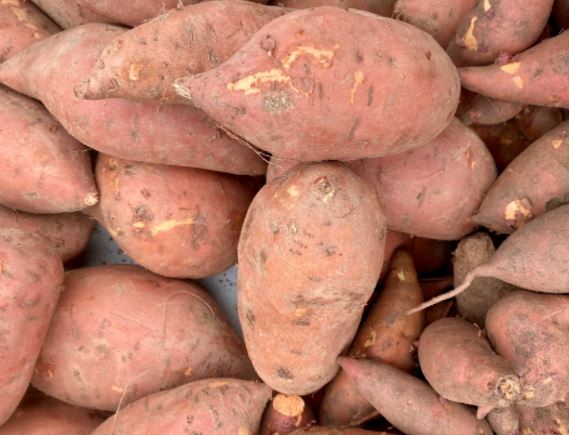
October 2021, Vol. 2 Iss. 9
If you’re anything like me, you start thinking of sweet potato pie the moment your Halloween costume comes off each year! Well, our coworkers on the UAC team and our new friends at CATEC have got us beat this year—they didn’t wait for Thanksgiving to break out the goodies. UAC planted these humongous “sweet taters” as Farmer Rich calls them, long ago in anticipation of Community Market Days. Community members who live in any public or subsidized housing neighborhood in the city can find the UAC team at the weekly location (rotating between Friendship Court, Midway Manor, Crescent Halls, Westhaven, South 1st Street, and CATEC) with pounds of fresh produce. Neighbors can pick out the produce they need for the week ahead at no cost. So, many of our neighbors have already the extreme pleasure of tasting these taters.
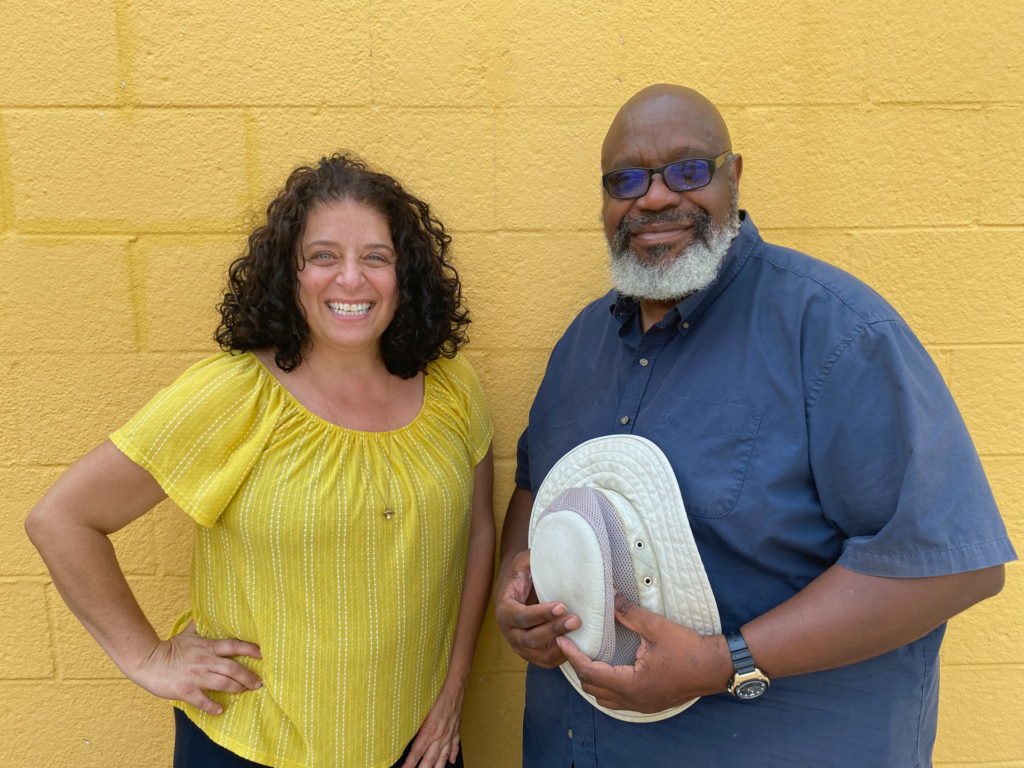
October 2021, Cultivate Co-Directors
The Cultivate Charlottesville Board is excited about the new Co-Executive Director leadership structure that was implemented this spring. As we continue to move forward with our organizational mission and what we aspire to per our Uprooting Racism Action Plan (developed after staff and board training from SoulFire Farm) the tenets of Decision-Making, Power and Authority were highlighted, and actionable steps were taken to remain true to this mission.
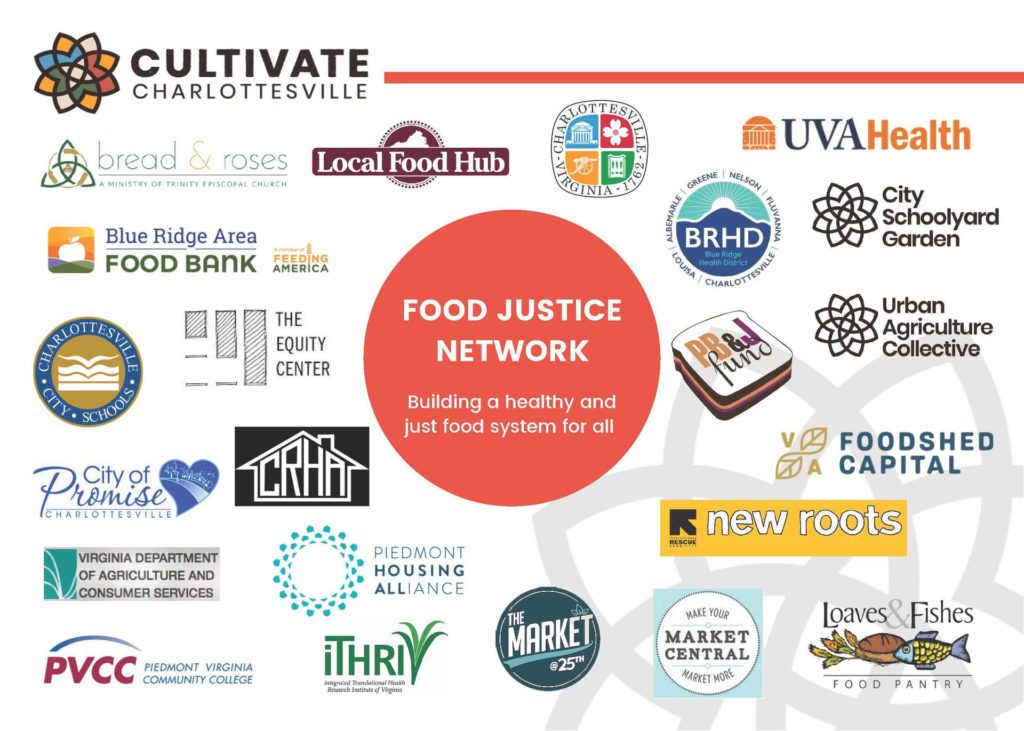
September 2021, Vol. 2 Iss. 8
Happy autumn food justice friends!
Please mark your attendance for the bi-monthly Cultivate Charlottesville Food Justice Network large group meeting! Our next gathering is being moved to October 20 from 10:30am-12:30pm on Zoom. We will be preparing for our Food Equity Initiative presentation to City Council coming up November 1st and are excited for your to engage and advocate!
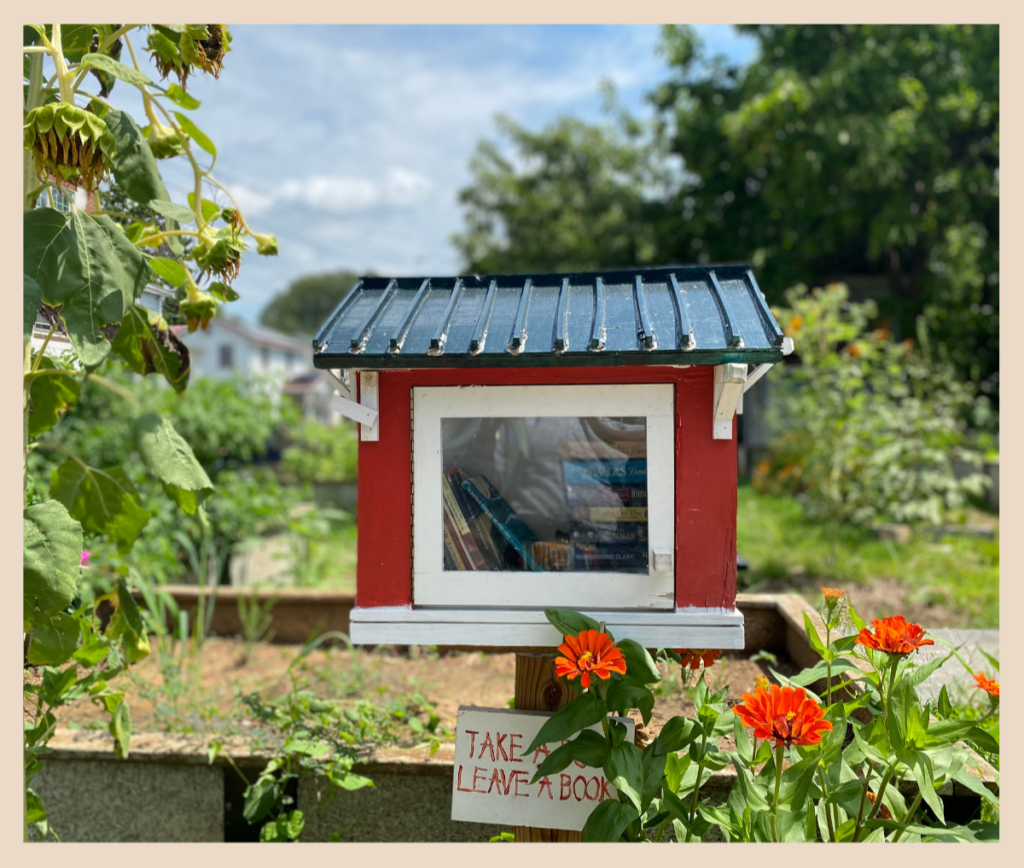
August 2021, Vol. 2 Iss. 7
School is back! Whether you are a student, parent, teacher, or neighbor. If you’re associated with Charlottesville City Schools, UVA, any of the private schools, or Albemarle County Schools. SCHOOL IS BACK! While we are excited for the return of in-person learning, we also acknowledge that the ferocity of COVID-19 is back as well. And we are wishing all school folks a safe and healthy beginning of the new academic year!
Cultivate will mirror the COVID-19 policy adopted by local education institutions and supported by the Blue Ridge Health District regarding vaccinations, testing, masks, and social distancing. We love working alongside so many of you and are committed to healthy and safe interactions with students, volunteers, colleagues, and community members.
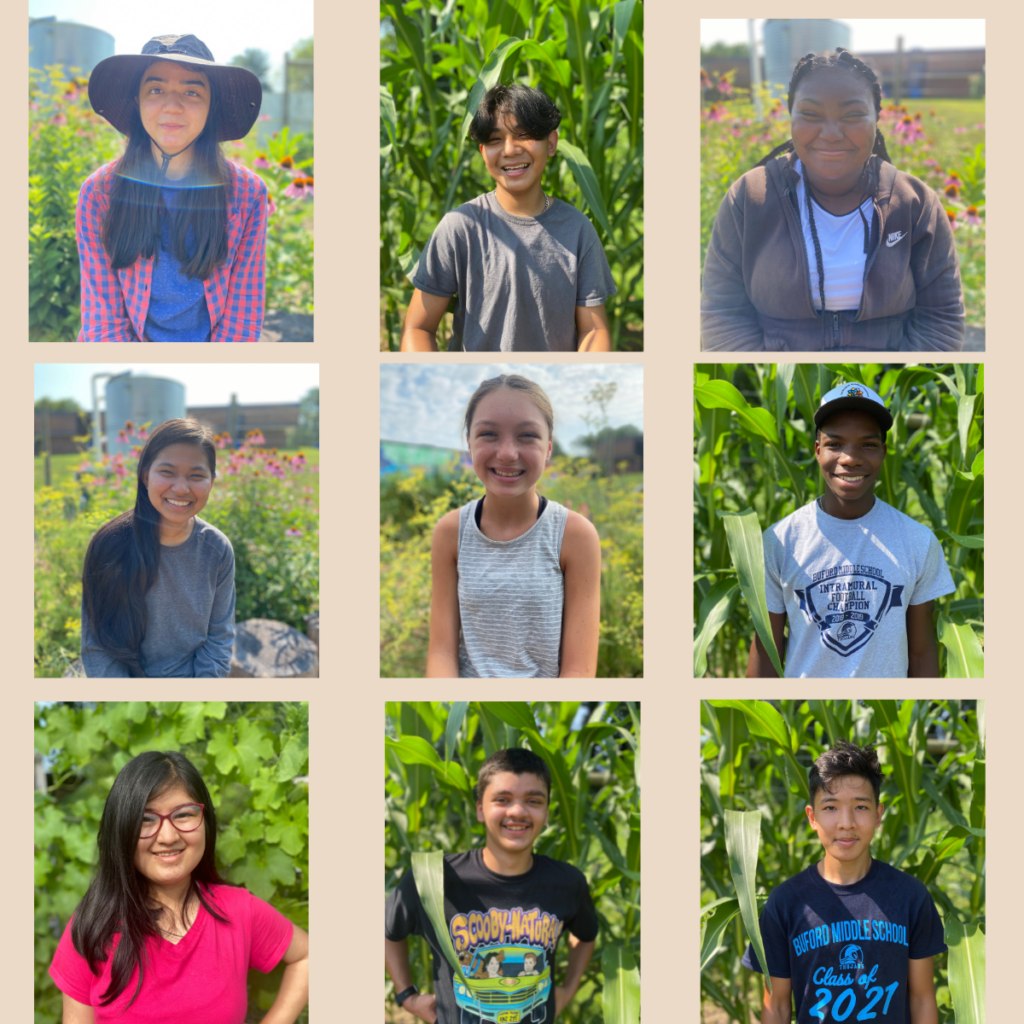
July 2021, Vol. 2 Iss. 6
It’s been hot. Extremely hot. The CSG garden coordinators & food justice interns have experienced it the school gardens, and the UAC farm team has felt it at 6th Street and the new CATEC location. FJN advocates & residents who live in public and subsidized housing know all too well that the heat of summer, which is increasing at an alarming rate due to climate change, brings with it the dangerous heat island effect.
As much as our team plans to take advantage of the cooler temperatures of early morning and late evening for garden work, people who live in neighborhoods without green space and tree canopy are not able to escape increased energy consumption, elevated emissions of air pollutants and greenhouse gases, compromised human health & comfort, and impaired water quality.
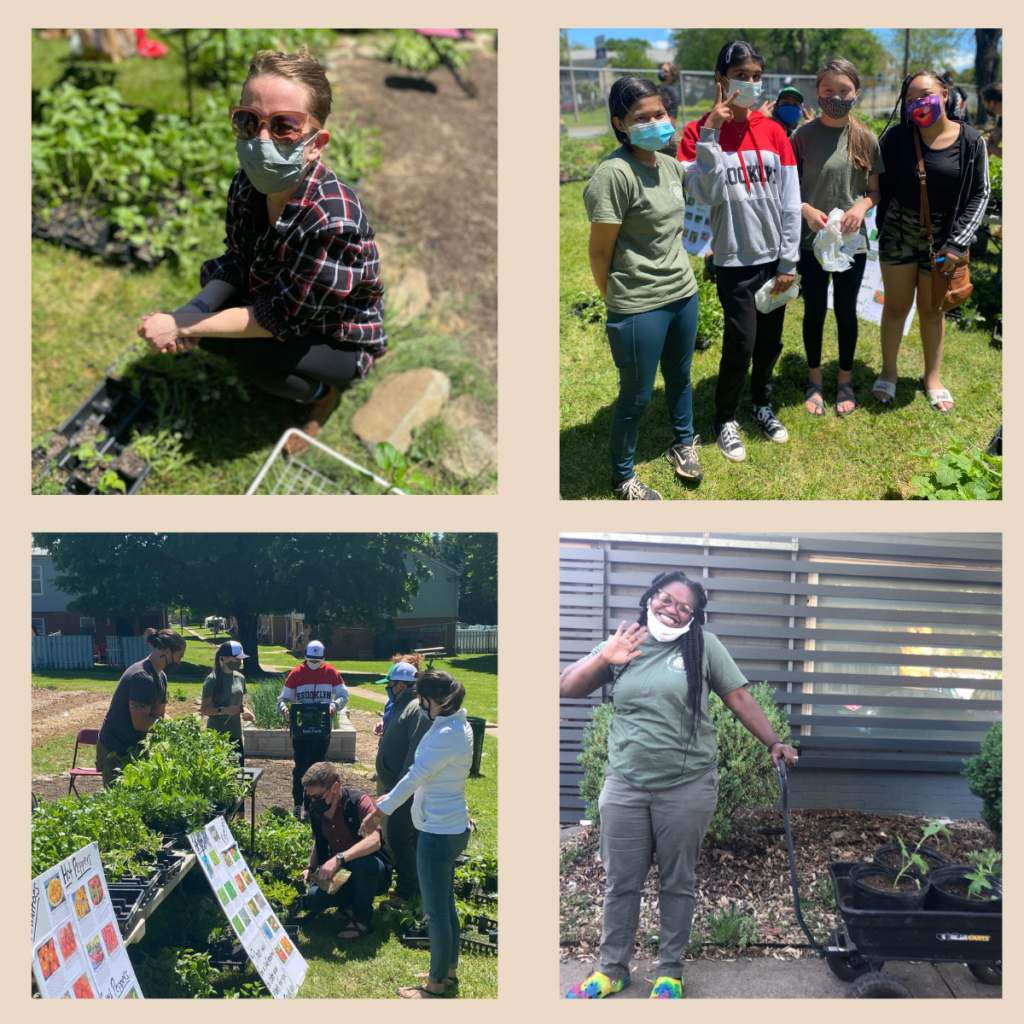
April & May 2021, Vol. 2 Iss. 4
Is anyone else feeling busy? Are we *checks notes* already approaching the half-way point of 2021? After two months of non-stop action, we’re catching our breath and catching you up on what we’ve been doing.
April and May were marked by many Cultivate events. We spread our thanks to our volunteers and partners at the virtual ROOT! celebration, spread information about the ways we work with the City to build a healthy and just food system at our ZOOM roundtable, and spread plants across the town through another successful annual seedling giveaway and sale.
Catch up with us here!
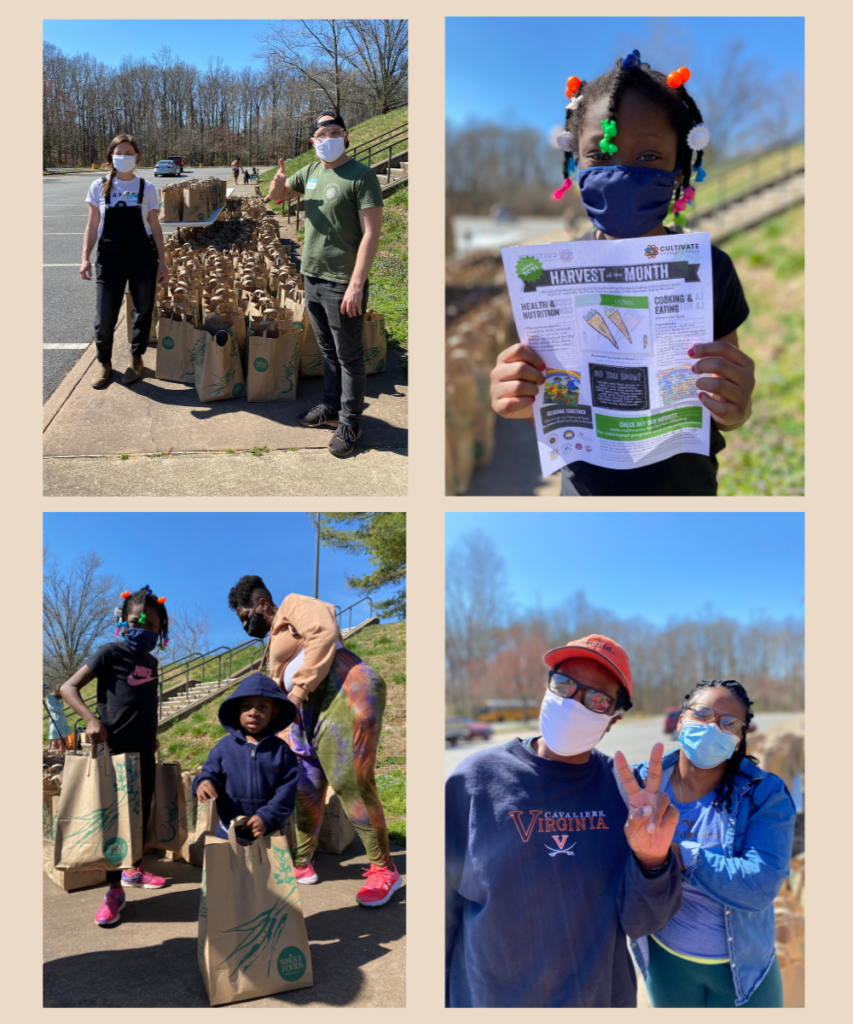
March 2021, Vol. 2 Iss. 3
Leading up to our launch as Cultivate Charlottesville almost a year ago, we picked the words GROW | SHARE | ADVOCATE as shorthand for our mission work toward a healthy and just food system in our city. On the surface, the word “share” represents our urban agriculture work of sharing food grown in and for community. But we also recognize the integrated work of each of our programs—City Schoolyard Garden, Urban Agriculture Collective, and Food Justice Network—for a common goal, and sharing can be seen as central to all of our work.
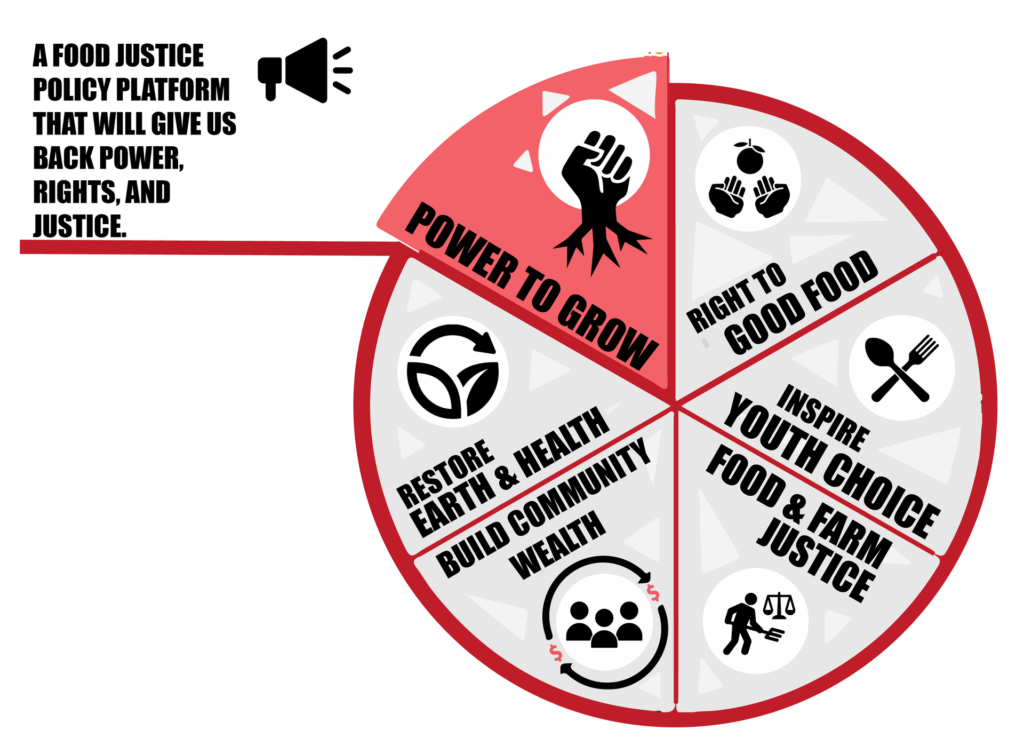
March 2021, Vol. 2 Iss. 1
In January & February Food Justice Network advocates, youth food justice interns, parents and nonprofit leaders showed up to express their support for the Food Equity Initiative Policy Platform. Congratulations! We heard emphasis on: Food as a human right, a desire for fresher school meals, a challenge to center food equity in school nutrition departments and take away the burden of functioning like a business, support for the intersection of food equity and affordable housing, an interest in a cooperative grocery owned by community members of color and more!
At this month’s large group Food Justice Network meeting we will be digging into each of the policy platform areas and exploring ways to build power and energy around action. Join us!

February 2021, Vol. 1 Iss. 9
Working together to cultivate a healthy and just food system requires complex, integrated efforts and partners with multiple forms of activism. During the Uprooting Racism training with SoulFire Farm this past fall, Leah Penniman shared their butterfly model that articulates four powerful strategies for transformation: Resist, Build, Heal, Reform. Each strategy has played a part in the long history of action toward liberation. At Cultivate, we also aim to engage across strategies in our programs, initiatives, values, and action. Is it possible, however, to Resist an institution with whom you are partnering to Reform? To take time to Heal the harm of racism while working diligently to Build new systems?

January 2021, Vol. 1 Iss. 8
This new year feels a lot like last year. There are some themes we would have liked to leave behind in 2020—the coronavirus pandemic, policing of Black people, and political turmoil. Food insecurity in our city is also an issue we wish could have ended last year, but we are reenergized to continue to GROW, SHARE, and ADVOCATE for a healthy and just food system for all.
January brings the opportunity to advocate for increased funding of #healthyschoolmeals. The food justice interns, community advocates, and Cultivate staff presented their and requests during the School Board/City Council joint budget meeting about the importance of infrastructure changes. With additional monies allocated toward school meals, schools can upgrade resources, continue to professionalize positions within the Nutrition Department, and provide healthy meals for all students.
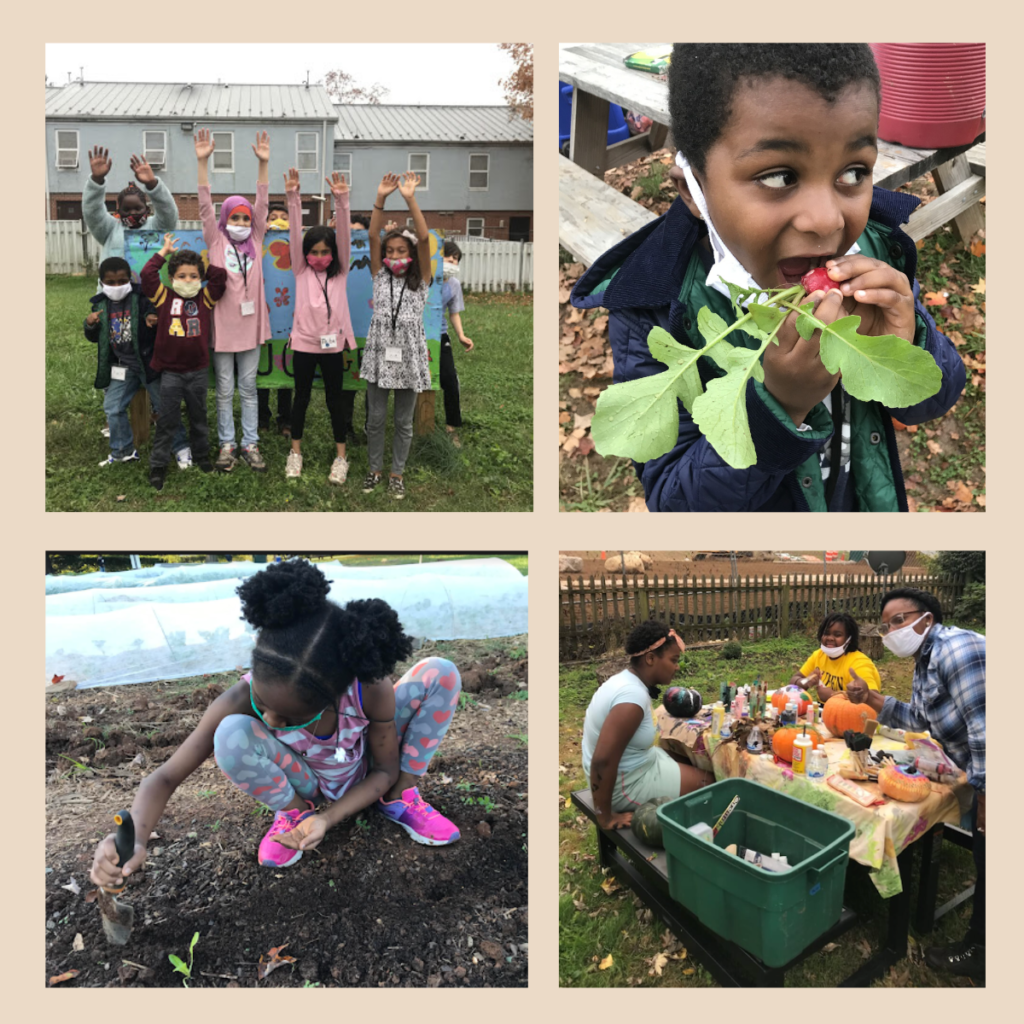
December 2020, Vol. 1 Iss. 8
As we say goodbye to 2020, we also say thank you to all of the people who have worked together to build food justice over the past twelve months. While our focus on a healthy and just food system in Charlottesville remains steady, the initiatives and community engagement pivoted to address immediate needs around food security during the COVID-19 crisis. The coronavirus pandemic shifted our course, but we were still able to take a huge step on the journey to more fully integrate our core programs—City Schoolyard Garden, Urban Agriculture Collective, and Food Justice Network—when Cultivate Charlottesville officially launched in the spring. That was our first foray into the world of Instagram Live and ZOOM webinar, and we all adapted to these new ways to engage together and work for equity.
Looking toward the new year, we will continue to host students in the gardens in a safe manner, work to find and develop new land for urban agriculture, and collaborate with organizations and City departments to address the inequities in our current food system.We wish you and your loved ones a joyous turn to the new year and continued health and community!
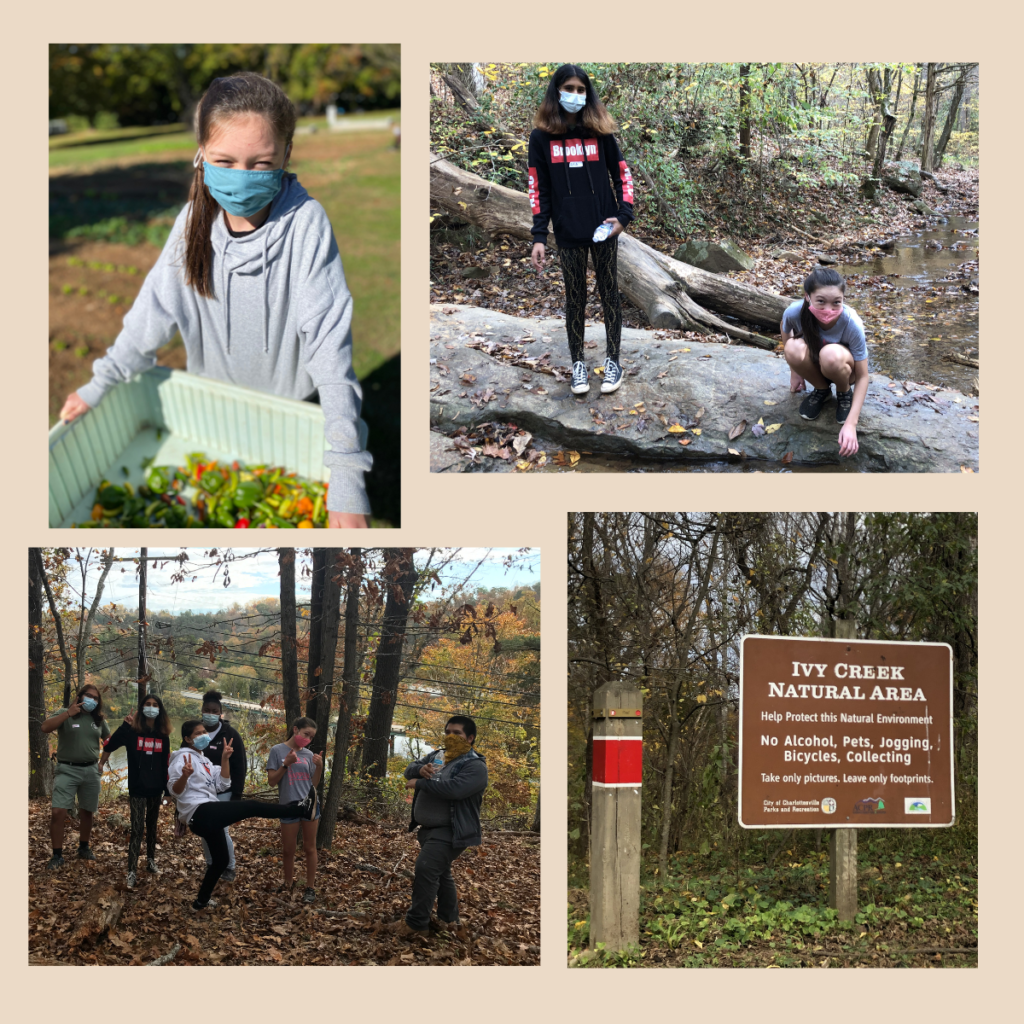
November 2020, Vol. 1 Iss. 7
One of the first things we learn when studying the environment is that healthy ecosystems are rich in biodiversity, the amount of variety of life on Earth. Biodiversity is the number of different species of plants, animals, and microorganisms that are thriving in an ecosystem. (NASA, Exploring the Environment, Global Climate Change) But, it is more than simply the number of species in an ecosystem that make it healthier and more resilient—what enhances ongoing, vibrancy, and resilience in an ecosystem are the connections and relationships between the species. This also rings true with our organizational and community efforts for change. Food Justice Network’s partnership with City Council for the Food Equity Initiative was built on the idea that we are more effective when we work together with multiple strategies, a diversity of partners, and intersecting issues.
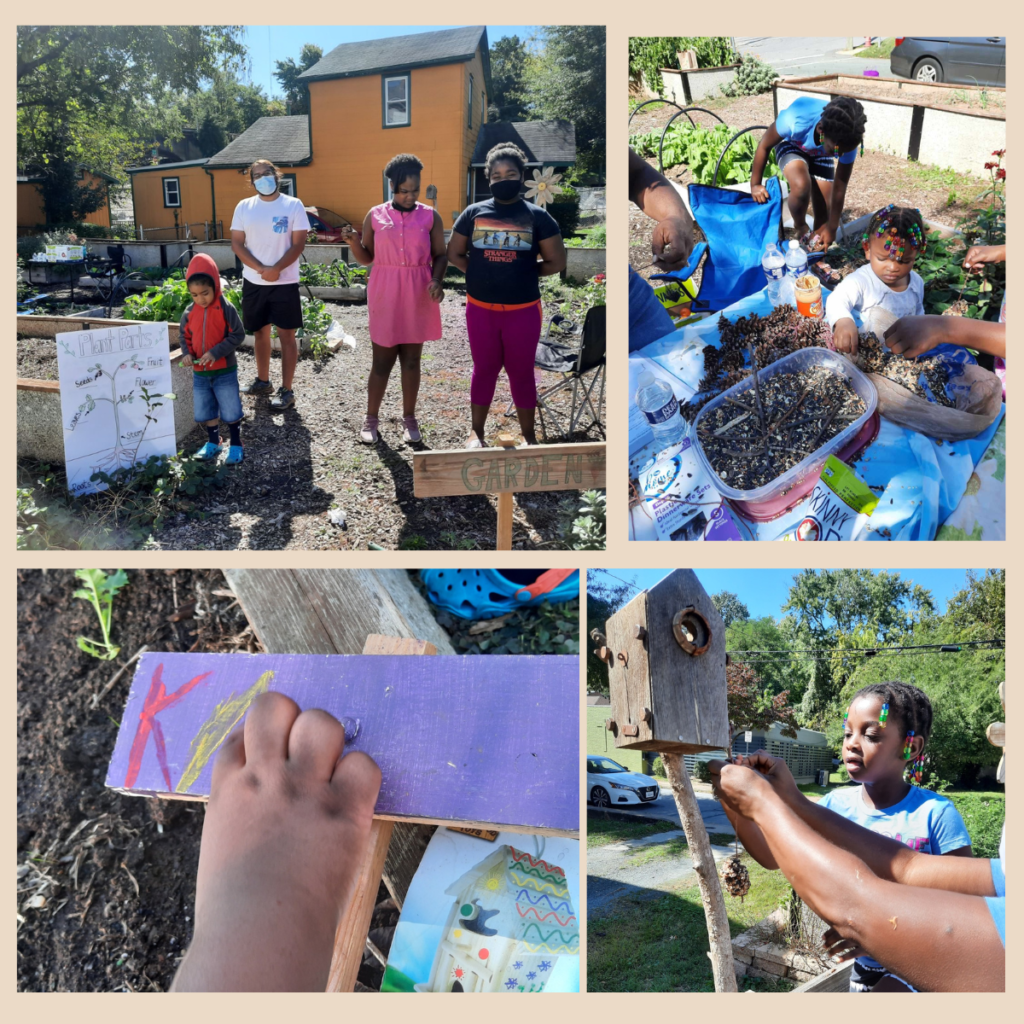
October 2020, Vol. 1 Iss. 6
October isn’t in the middle of the calendar year, but it feels as though we’re right in between things. It’s not the end of the summer/beginning of the school year anymore, and yet it’s not quite the holiday season either. Even though we still have one month until Thanksgiving and two until the December holidays, October offers much to celebrate. From Indigenous Peoples’ Day to Farm-to-School Week to the Urban Agriculture Collective Garden Gathering, the Cultivate community has been hard at work sharing history; honoring the stewards of our land; strengthening the bond between fresh, local produce and our school meals; and thanking everyone who has made our Community Market Days successful in the middle of a pandemic.
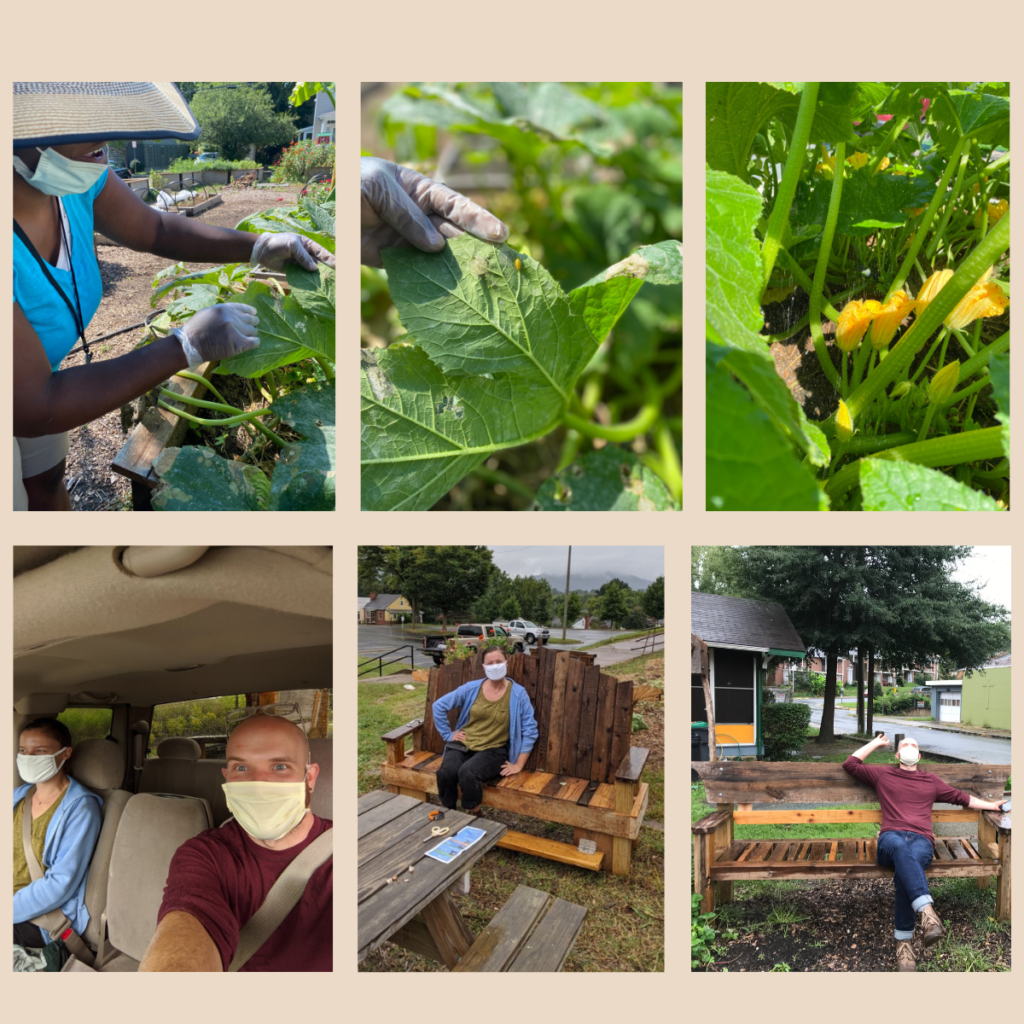
September 2020, Vol. 1 Iss. 5
Fall might be the best season (the mosquitos have been doing their best to keep summer out of the number one spot) to experience this place.
In Charlottesville and the surrounding counties, we are in the unique position to live in this sweet spot at the base of the mountains. From hikes and camping to farms and orchards to rivers and trees, this land provides endless opportunities to bask in the abundance all around us. Come autumn, when the leaves display their most diverse and fiery hues, we’ve delighted in those neon green buds and first warm breezes of spring and wiped the sweat away as we’ve harvested and enjoy the summer bounty. Now fall bestows cooler days upon us that will take us into possible snowfall and definite bowls of piping hot soup. This is quite a place to live. Even though some of us were born and raised in these foothills, we are not the first to cultivate and benefit from this land; the people of the Monacan Nation hiked these woods, drank from these rivers, cultivated these fields, and basked in this bounty long before us. Their descendants (a mere 2,000 currently call Virginia home) have endured hundreds of years of colonialist and racist practices to survive and live here today.
Read our entire Indigenous Acknowledgement by reading this month’s newsletter and join us in sharing the stories and voices of the original stewards of this land.
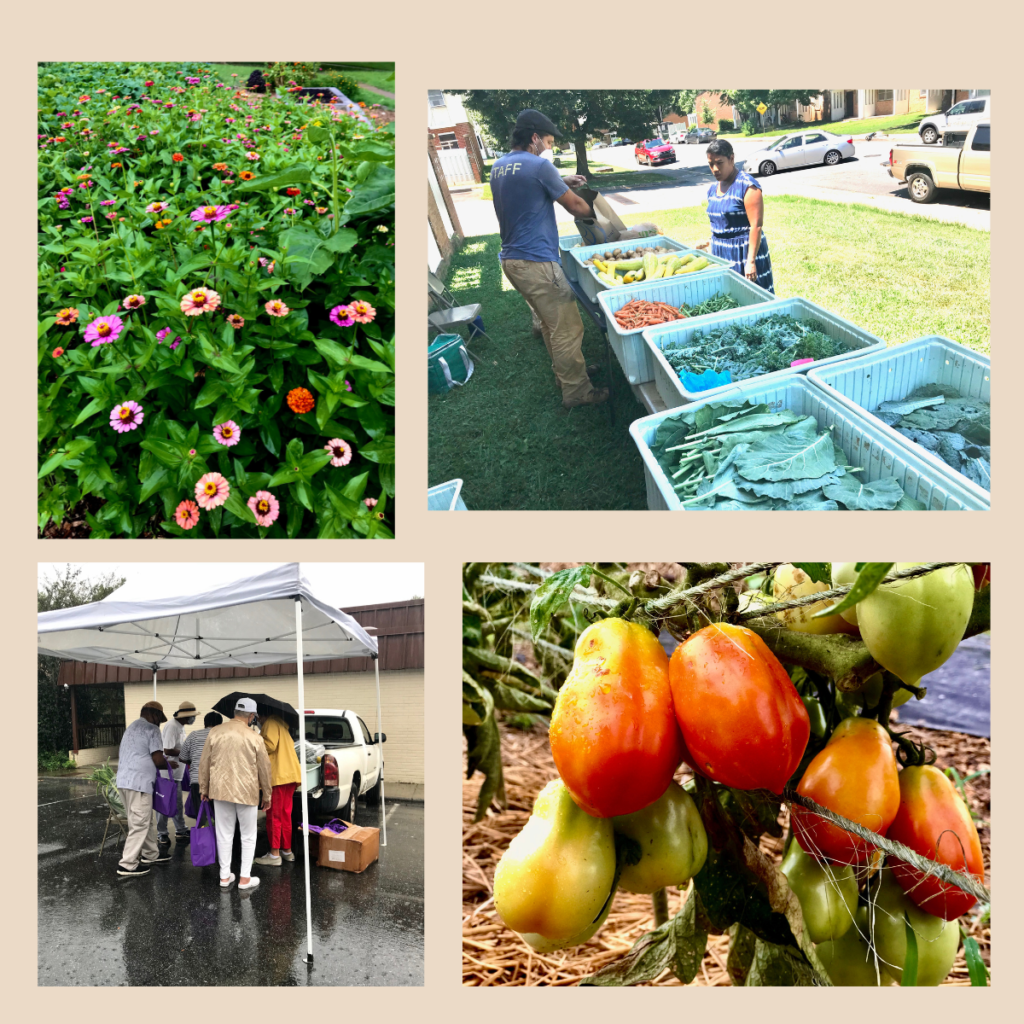
August 2020, Vol. 1 Iss. 4
Not Goodbye – Just see you later. As August comes to an end, two core initiatives investing in youth leadership and community health are moving into the next phase of work. The Food Justice Interns under the tutelage of Miss Shannon and a team of Cultivate staff members have completed their summer session and are—along with their classmates all over the city—preparing for the virtual beginning of the school year. This year, the Youth Intern team will continue a robust schedule during the academic year. Food Justice Network’s collaboration with Frontline Foods and multiple partners to organize a distribution initiative that helped businesses owned by people of color to survive while providing meals to folks who needed emergency food access is shifting gears as well. At the same time, the summer show still goes on! Gardens at the schools and in the community are being tended while connections with everyone from the City Schools to the University to our two major health systems to local donors are still being cultivated each and every day.
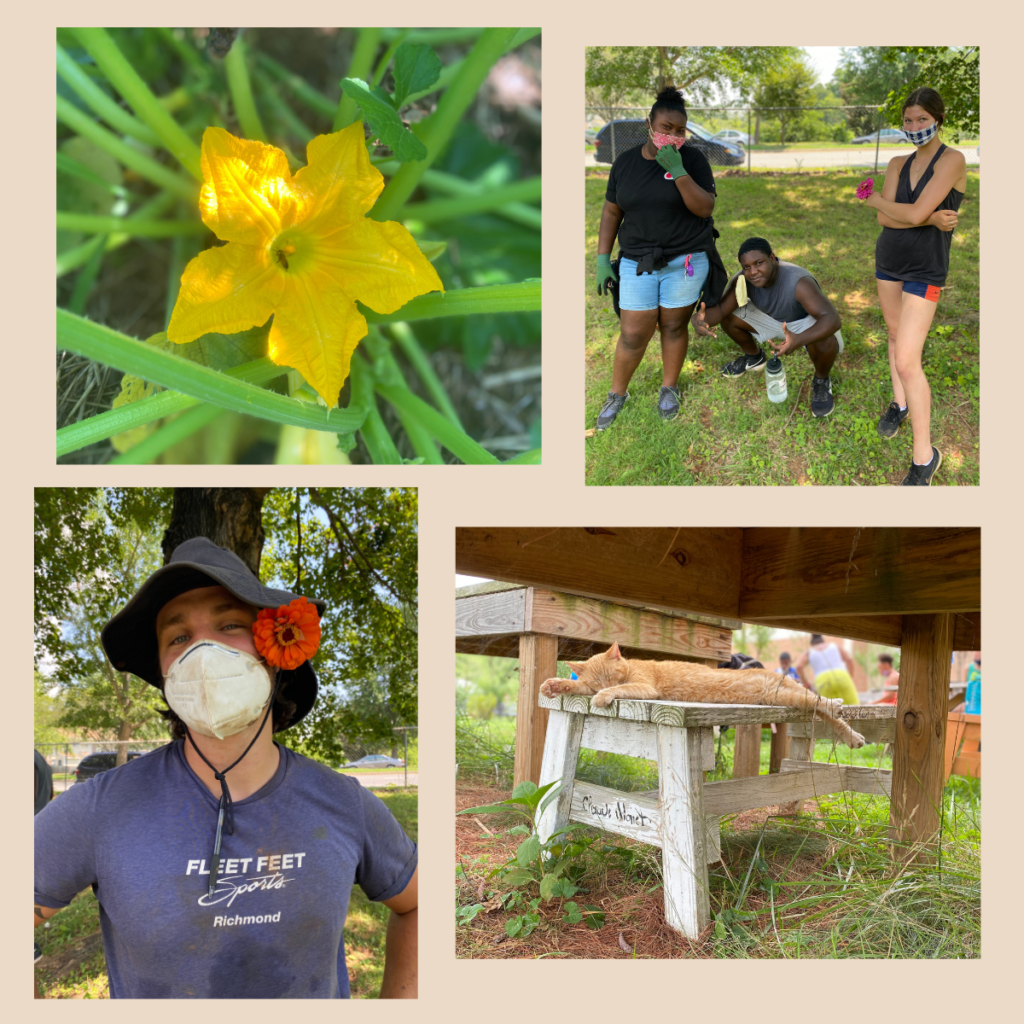
July 2020, Vol. 1 Iss. 3
On the Rise. It’s hot out here. And the show goes on. Miss Mackenzie and Mr. Davis share stories from school gardens that will make you want to eat a Mexican sour gherkin (that’s a real thing) and stop to smell the flowers. In collaboration with many other organizations, Food Justice Network continues to provide emergency food access and COVID-19 to support to those who test positive in our community. At the same time, FJN leaders remind us of the importance of advocacy in times of crisis as well as when things seem to be less urgent. Urban Agriculture Collective had a trial volunteer day this month, which went well and opened the door for more socially distanced gardening opportunities. Yolonda Adams and Sarah Wayne were guests on To Your Health on 97.9’s radio show—be sure to take a listen. Cville Weekly’s Serving Up Relief is going strong, and you still have plenty of time to bid on awesome prizes. The Cultivate Social Justice Book Club shares some of the titles that have been the topic of great discussion as spring turned into summer. Lifeview Marketing created a wonderful video to help spread the word about the Cultivate Charlottesville mission, be sure to share it with your friends. As always, catch a glimpse of the fruits of our labor (as well as the CHS cat Spike).
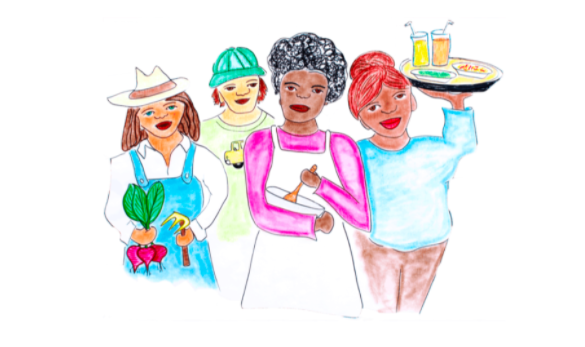
July 2020, FJN Blast Vol. 1 Iss. 1
Advocate for Black & Brown Lives In Our Food System During COVID-19. In this issue of the Food Justice Network newsletter, the Network asks that you join in taking action against Tyson Foods. Read more about our demands and why it is so important that we stand in solidarity with food service workers across the nation. Also in this issue, updates on our text messaging service, a Member Spotlight and information about our July 22nd Large Group Meeting.
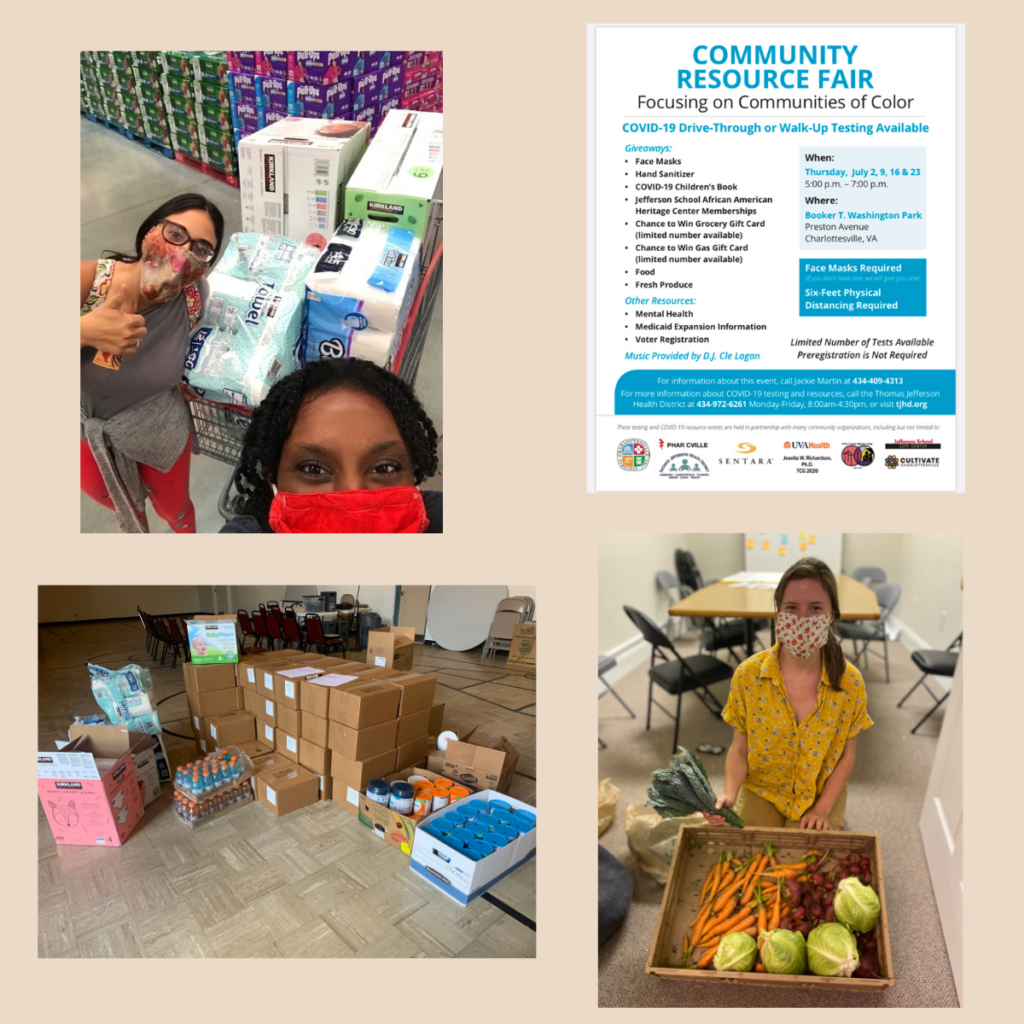
June 2020, Vol. 1 Iss. 2
June was a month marked by continued outrage and protest around the killings of Black people in America. Read our statement regarding Black lives. Much has happened in our offices in the last month including Elza Thomas joining our FJN staff—find out her favorite food and why she’s excited to work at Cultivate. We’re over-the-moon excited that the Summer Food Justice Interns have started! Revolutionary food and music recommendations abound just like the fresh produce from our UAC gardens—check out what’s good.
Everyone has been hard at work to support the wraparound COVID-19 resources being provided by FJN and many other organizations in the community. If you don’t take a peek at this newsletter, you’ll miss a couple of our youngest gardeners—the sons of one of our board and one of our staff members. Be sure to read Community Climate Collaborative’s interview of Cultivate ED Jeanette Abi-Nader. Cville Weekly and a group of generous donors are coming together to host Serving Up Relief, a fundraiser that will benefit the Food Equity Fund.
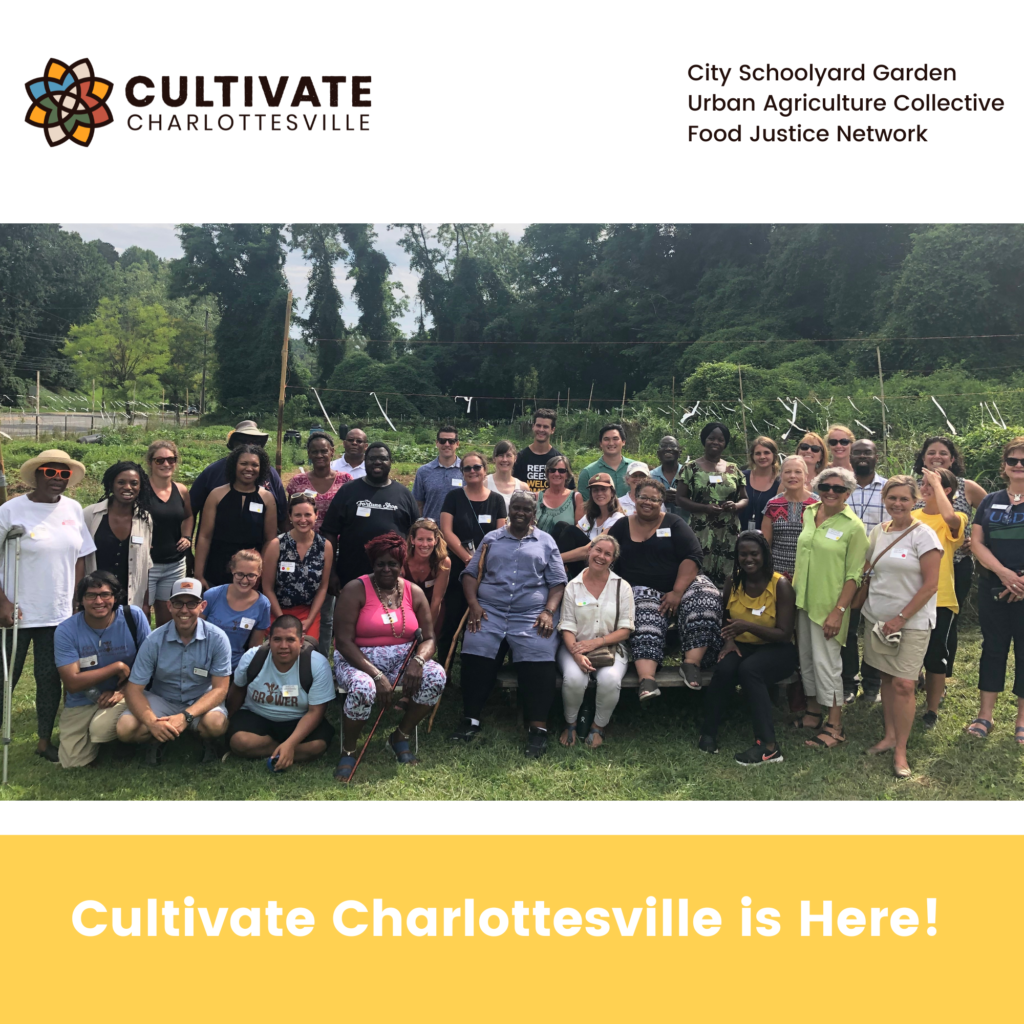
May 2020, Vol. 1 Iss. 1
We’re official!!! Even though COVID-19 has thrown a couple of obstacles in the way, Cultivate Charlottesville has launched! Find out more about what it means to have City Schoolyard Garden, Urban Agriculture Collective, and Food Justice Network integrated working to build a healthy and just food system.
Buford Middle School students work to plant and grow almost 10,000 seedlings each year. With a little help from staff, we were able to finish what the students started and donate and sell plants to hundreds of community members. UAC Market Days begin in June, and staffers are adapting the model to ensure people still have weekly access to fresh produce through the summer and into the fall. COVID-19, and the ensuing quarantine, has made food accessibility more difficult for many people who were already battling this issue. FJN has led the efforts through collaboration with the City and many partners to provide emergency food efforts.
Each year we take time to thank and recognize our volunteers and partners. This year, we hosted our annual ROOT! celebration via ZOOM and were joined by so many of our favorite people. Cultivate partnered with Charlottesville Tomorrow to publish op-eds written by two of our staff members and articles featuring our colleagues written by Cville Tomorrow journalists. Find those articles and more on our PRESS PAGE.
Read more!
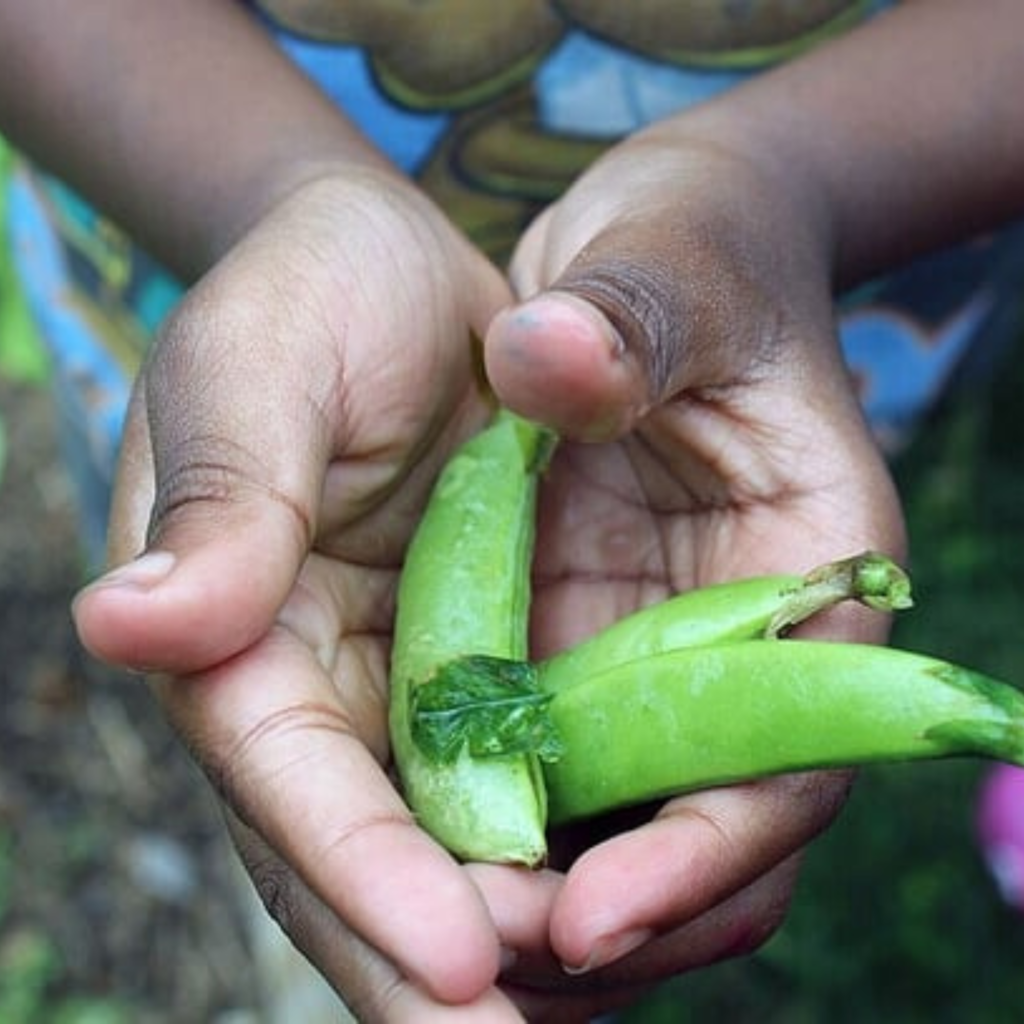
Three Programs Come Together as One.
City Schoolyard Garden connects youth to where their food is grown, provides experiential learning, and invests in youth leaders. Urban Agriculture Collective continues a long standing effort to build bridges across differences through growing on public land and sharing at Community Market Days. Food Justice Network advocates for food equity. Together we are CULTIVATE CHARLOTTESVILLE, an integrated approach to to building a healthy and just food system personally, in community, and across systems and structures.
Ryan Thayer is excited to join Cultivate Charlottesville as Co-Executive Director. Born in Norfolk, Ryan grew up in the Bay Area as the 6th generation in his family to call San Francisco home. For nearly two decades, Ryan has worked to cultivate equitable and community-driven food systems that center supporting processes that engage community members to find their voice and step into their power. This time has shown him the importance of connecting with the Earth, and each other in community, as well as the power food can hold in healing deep systemic wounds. He believes building intentional communities in healthy relationships with the land is crucial to our collective well-being. He holds an Urban Studies and Planning degree from San Francisco State University and a Masters in Urban Affairs from the University of San Francisco. Outside of work, Ryan is a lover of anything basketball-related, traditional archery, live music, and wilderness living, and is slowly working on a speculative fiction novel. He lives in Charlottesville with his partner and two dogs.
Emma Brodeur first worked with Charlottesville City Schools by volunteering as a UVA Curry School of Education student at Albemarle High School and Burnley-Moran Elementary. While taking a break from her studies in 2012, Emma led backpacking trips with kids ages 8-17 in the Washington-Jefferson National Forest. She returned to UVA and transferred to the College of Arts and Sciences, where she completed her undergraduate degree in Spanish and Studio Art. Emma returned to City Schools through the Bridge Progressive Arts Initiative, teaching after-school art classes for 4th graders at Clark Elementary. Cultivate Charlottesville gave Emma the opportunity to unite her teaching experiences in the school garden. During her weekly classes at Clark Elementary and Johnson Elementary, she encourages students to explore the garden with confidence and kindness.
In partnership with community volunteers and community members, Cultivate Charlottesville builds food equity by growing and sharing fresh, organic produce with Charlottesville residents with limited financial resources.
Community Market Days are also a great place to reconnect with friends and neighbors, pick up some recipes, or watch a cooking demonstration.
CLICK HERE FOR 2024 COMMUNITY MARKET DAYS TIMES AND LOCATIONS!
Nik Lewis is the UAC Program Associate. Nik is of African American and Puerto Rican descent. He grew up in the Charlottesville area and came to urban farming as a way of centering himself and getting his hands in the soil. Working in the garden brings Nik fulfillment and joy. He enjoys giving back to and caring for Mother Nature. Above all, Nik creates a source of happiness and connection for the residents to whom we provide fresh and healthy produce.
email: nik@cultivatecharlottesville.org
Kellyn Kusyk grew up just outside of Charlottesville, where their mother turned their suburban backyard into a quasi-homestead, complete with vegetable gardens, a fruit orchard, ducks, chickens, geese, and indoor/outdoor pigs who learned to open all the kitchen cabinets and purposefully forgot their house-training when guests were over. Kellyn graduated from Charlottesville High School in 2016 and majored in Ethnicity, Race, & Migration while an undergraduate at Yale University, studying how systems of power are built and maintained along lines of race, class, gender, and sexuality in the United States. Also while in college, Kellyn was active in student organizing movements around endowment justice and unfair labor practices for professors in the Ethnicity, Race, and Migration department. After graduation, they were a woodworker, concrete laborer, line cook, and bartender, before eventually joining Cultivate Charlottesville in 2023. They are thrilled to bring their background in fabrication and homesteading to the food justice movement in Charlottesville. They are a conceptual sculptor, and live in the woods with their partner, one good dog (Trout), and one bad dog (Gogo).
Email: kellyn@cultivatecharlottesville.org
Trinity Hughes is a community organizer born and raised in Charlottesville VA. She has sparked local change in education that has ripped across the state of Virginia. She is passionate about connecting her community with resources. Some of her recent work has centered around mutual aid and curating spaces to heal. Trinity is also a huge advocate of uplifting those with lived experience to voice their concerns on how we can fight against racial inequities. Outside of work she loves to spend time with her dogs Prince & Skylar and family and friends. She is so excited to be a part of Cultivate Charlottesville and The Food Justice Network!
Sakeena Alkateeb joined Cultivate Charlottesville as the Grants, Evaluation, and Outreach Systems Director in 2024. She has worked in various roles in the nonprofit sector, including as a Philanthropy Manager and Equity Liaison at ReadyKids, a Development Consultant at CIMA Consulting, and a Project Manager and Grants Coordinator at the Central Virginia Farm Workers Initiative. Before working in philanthropy, Sakeena’s background lies in makeup artistry and community organizing. Her greatest passion and drive is fighting for racial equity and accessibility. She holds a B.A. in Sociology from the University of Virginia. Sakeena moved to the U.S. in 2009 and lives in Charlottesville with her partner and two cats.
Leah Leon is our long-time Garden Associate. As a Charlottesville native, Leah attended the city schools and found themselves in the Buford garden while attending middle school quite often. Leah became one of the first students to participate in the Garden Aid program the school had to offer and while at Buford, Leah developed a deeper appreciation for the environment and put their heart into maintaining the garden space while being a team player for their peers. Although they moved to the county during their high school career to attend Monticello High School, Leah has been loyal to the organization and became a youth intern for 2 (3?) years participating in various projects with other interns until officially taking the Garden Associate position. Although new to the title, they are very much familiar with how the organization works and excited to help support the organization and staff however they can. Leah is currently attending PVCC while taking an interest in biology and often likes to share a random fact or idea unprompted.
Email: leahleon@cultivatecharlottesville.org or volunteer@cultivatecharlottesville.org
Susan Adeeb bio coming
Email: susan@cultivatecharlottesville.org
In 2023 Cultivate Community Engagement Cohorts talked to hundreds of community members through door to door surveys, in depth listening circles, and a community roundtable. We asked, “Would you like to see an urban farm site at Booker T. Washington Park?” and “What would your vision for an Urban Agriculture Collective farm site at Booker T. Washington be?”.
Read “White Paper on Building a Healthy and Just Local Food System”
Our food system does not serve us all equally. The result of this inequality can be seen in the health inequities apparent across race and class. Food justice calls upon us to develop tools and frameworks to adequately address these race and class food related inequities.
Over the years FJN has collaborated with partners and community to develop reports that tell the story of community voice and our work. Check out these documents:
The Power to Grow is a community engagement, awareness, thought leadership, and policy action campaign with a goal of securing public space for urban agriculture, primarily led by and for BIPOC residents. The campaign will also educate the public about historical inequities in Charlottesville, explore community support for an Urban Agriculture Collective farm site in Booker T. Washington Park, and ask city council for an area of Booker T. Washington Park to be dedicated for community-based urban agriculture.
This campaign is designed to illuminate the issue of land access and ownership as the foundation for economic and social wellbeing, especially in regards to urban agriculture and the Charlottesville Black community. This project continues the work started by residents of public and subsidized housing in 2007 when they built a farm site at Friendship Court in order to grow and share food and power. The Power to Grow aims to secure long term leases for urban agriculture space in a historically Black Charlottesville Park. It also aims to advance racial equity by spreading awareness of Black land loss and gentrification in the city. These goals were articulated as a priority from residents in the 2019 Local Places events and the 2021 Food Equity Initiative Policy Platform.
Our intention of the Power to Grow Campaign is to engage the community to determine their wants and needs for a garden in Booker T. Washington Park and to effectively convey the community’s support for this project to council..
City of Promise is in the heart of the 10th & Page neighborhood and Westhaven Community with a mission to end generational poverty, and to foster a culture of achievement in which all children in our community graduate from high school, ready for college or career. Cultivate Charlottesville has been partnering since 2015 to host a garden at 908 Page Street to engage youth and community.
We believe that a pathway for leadership that activates spaces where community leaders can invest their power and wisdom towards systemic change is strongest when it is community centered, diverse, and inter-generational.
Why diverse and intergenerational?
Systemic inequity in our food system affects our community at every stage of life. We’ve found that working across generational lines simultaneously builds a deeper understanding of systemic injustice while cultivating new traditions honoring voice, power, and decision-making among our multicultural grassroots leadership group.
What is a community engagement cohort?
Community engagement is not just a one time event or festival. At Cultivate we aim to create and implement systems and practices that actively engage grassroots community members across the scope of Cultivate’s work. Launched when students in the Buford MIddle School Garden Aide Class said they wanted to continue to work in their school garden over the summer, we began building paid opportunities for youth and adults. These cohorts come together as teams, build food justice knowledge and capacity, and work across a specific time frame, with specific goals in mind.
Youth Food Justice Interns (high school students): City Schoolyard Garden program hosts an eight-week summer youth food justice program for up to twelve city students. Youth care for the schoolyard gardens, cultivate team building practices, and have two core capacity building units on food justice and healthy school meals.
Food Justice Apprentices (young adults around 18-24): Food Justice Apprentices are part of a cross-program cohort designed to build leadership opportunities for young adults who have come through the K-12 Cultivate initiatives while strengthening Cultivate’s effectiveness and community voice. The Food Justice Apprentices have three primary responsibilities including: supporting a specific program area of Cultivate’s work, advancing a cross-program advocacy campaign, and building capacity as a cohort of peer learners and leaders. The Food Justice Apprentices also support special projects across the organization as needed.
Food Justice Community Advocates (resident leaders -adults and elders): The Food Justice Community Advocates cohort aims to amplify community leadership and be a bridge with city leaders around critical issues of food equity and racial justice in Charlottesville. This paid six-month cohort has been focusing on The Power to Grow campaign and engaged over 300 residents in building a vision for urban agriculture in Charlottesville.
Food Equity Initiative Policy Platform
The Food Equity Initiative Policy Platform was developed with input from over 300 individuals, 125 youth, and 10 city departments.Through six core planks, the FEI Policy Platform outlines community recommendations for building a healthy and just food system including strategic values, funding priorities, and concrete goals, policies, ad practices for City Departments and partnering organizations to deepen their capacity for food equity.
Michele Gibson has returned to Cultivate after previously working as a Community Advocate as the Community Advocate Lead for our 2023 Cohort.
Amyah Limbacher was born and raised in Charlottesville, VA. She is a proud big sister to her younger siblings. She has been with Cultivate for four years, starting out as an intern in high school and now a Cultivate Apprentice working with the City Schoolyard Garden program. Her favorite part of the job is working with the youth and teaching kids about how gardening ties in with the food system. As a former CCS student, she loves seeing how things are changing and encourages students to use their voices. Having grown up in a single-parent home, she has seen food insecurity firsthand and wants to be a part of the change in our food landscape. She is thorough, passionate, and determined in her work. Amyah is also a first-generation college student working towards a business associate degree. She aspires to one day be an entrepreneur and a flower farmer.
Calista Barbour has been a part of Cultivate for four years on and off. She loves being outside in the garden, it helps her feel grounded. Being a part of Cultivate has helped stimulate her creativity and helps her to see the importance of food equity and abundance. Coming from a low-income family that was mostly dependent on government assistance, she knows what it feels like to be food insecure. It feels good to stand up for food justice. As a new mother, she feels more connected being able to have her daughter be a part of an organization that she has been with since middle school. She aspires to be is more bold, assertive, and driven in my day-to-day life. Calista also loves music and art.
Emmanuel Quezada-Romero (or Manny) has been working with Cultivate for several years. He moved from Mexico to Arizona to Virginia and has had a life full of experiences. At the age of 12, he started working with Cultivate as a student volunteer. He worked with Cultivate throughout his school career as a Garden Aide and a Food Justice Youth Intern and learned many things. In school he was in chess club and is a very fast learner. He is quick to adapt, a jack of all trades. Although he is not a master of all things, he is handy and has a lot of skills that he puts to good use in helping others. Manny believes that life is as fun or boring as you make it, whatever effort you put into it is what you will get back from it.
email: emmanuel@cultivatecharlottesville.org
KJ Howard has been with Cultivate for about 6 years, since 7th grade. He was a student intern, apprentice and most recently was hired on staff as FJN Associate. His love for gardening and working as an intern for Cultivate is what made me want to join the Community Advocates Cohort. He cares about food justice because during his childhood he experienced food insecurity and has a deep level of understanding about issues around food in Charlottesville. KJ is a kind and confident leader. FUN FACT: KJ was president of the Mandarin-Chinese Club at CHS for three years.
email: kj@cultivatecharlottesville.org
Ashley Freeman is a Charlottesville native youngest of three. She is a graduate of CHS and has four amazing daughters who she devotes all of her time to. In 2019, Ashley joined the PHAR board and served for one year which got her more connected to the community as a resource for folks. She is a go-getter, always looking to grow, and makes sure that she provides for her girls. Ashley first got involved with Cultivate through Garden Coordinator, Yolonda Adams, and has started a garden of her own with her daughters.
Each year Cultivate Charlottesville joins hundreds of organizations in a shared journey of learning and charting a course of action to dismantle racism in our food system and our world.
The Racial Equity Challenge happens each year in April and can be a vital tool to:
Watch the 2023 Racial Equity Challenge Launch Webinar here or read the transcript. You can also check out the 2023 prompts here.
We believe that equitable approaches to building a food system that works for all, values the voices of those that are oftentimes left out of decision-making conversations and leadership roles. The goal of the Community Advocate Initiative is to strengthen the capacity of community members working alongside organizational representatives, city departments, and other community-based organizations fulfilling the mandate set forth by City Council’s Food Equity Initiative.
In 2023, we welcomed a cohort of six Community Advocates. This program provides local leaders with the confidence in their advocacy skills and ensures that community voice and choice is always central to our work. Advocates gain advocacy skills, create connections within our community, survey local residents about the Power to Grow initiative, and collaboratewith the Food Justice Apprentices to create an inter-generational dialogue around food equity.
In Spring 2023, Cultivate Charlottesville added the next step in our stairway to leadership: the Food Justice Apprentice Cohort. This cohort is a paid opportunity for young adults who have experience in the Cultivate gardens and are looking to learn more about careers in food justice.
Food Justice Apprentices:
To learn about our individual apprentices, visit our staff page.
Food Justice Network believes in igniting genuine dialogue and convening our city around a core vision. We host a series of events such as round tables and conferences, deliver presentations on our research findings, and invite powerful food justice activist to inform our local movement.
Our FJN large group gatherings are open to everyone. In 2023 our meetings are focused on exploring each plank of the Food Equity Imitative Policy Platform to see how our work intersects. Meetings topics are:
To learn more sign up for our monthly newsletters HERE. To join the FJN google group contact quentia@cultivatecharlottesville.org
Sarah Wayne is a lover of all things related to food. She was born and raised in Greensboro, NC and then moved to Burlington VT to study Nutrition and Food Science at the University of Vermont. During her time in Vermont, Sarah worked on various farms in the area to learn more about the local food community and farming practices. As a Youth Engagement & Garden Coordinator, she strives to nurture curiosity, build relationships, and foster a connection between children and nature through exploration, experiences, and play. Since moving to Charlottesville in 2016, Sarah has enjoyed biking, hiking, and canoeing through the many beautiful areas surrounding Charlottesville
Harvest of the Month program is a unique partnership designed to build capacity, health and food security by increasing preference and exposure to fresh, healthy, local foods. Through an innovative and comprehensive program, youth, families, schools and community partners are introduced to a locally available crop each month. A backpack flyer with recipes, growing and nutritional information and a related library book goes home with each student in English, Spanish and Dari (switched from Arabic in 2021). Check out our flyer archive!
UAC continues 16 years of grassroots work growing in public and subsidized housing neighborhoods, amplifying the contributions and decisions of Charlottesville residents faced with food insecurity. This grassroots urban farm grew out of the 2007 Quality Community Council’s (QCC) Farm Initiative, led by Karen Waters with support from Jenifer Minor and Tami Wright. The catalyst for the creation of the farm was to work in partnership with community residents at public and subsidized housing locations. The goal was to work to build bridges between Charlottesville neighborhoods where people from across the socio-economic spectrum could grow good food and healthier communities together.
At its peak, UAC managed four urban farm sites and produced over 17,000 pounds of food in a single year. Because of necessary housing redevelopment, UAC downsized in 2019 from approximately 1 acre of land to its current size of 22,000 sqft, or about half an acre. Our three farm sites can be found at the corner of 6th Street and Monticello Avenue, the corner of West Street and 9th Street, and behind CATEC, the Charlottesville-Albemarle Technical Education Center. We are working with planners and community members to find innovative solutions to grow food and meet food security needs in our community.
Aleen Carey was born in Chicago, raised in Lancaster, PA, and moved to Charlottesville with her family while in high school. She then became a high school Spanish teacher and shared her love of the language and culture with hundreds of students over a decade. When she left the classroom, Aleen joined the CSG Board as a way to stay involved in education. After serving on the board for six years, she joined the staff in January 2020. Aleen caught the philanthropy bug while completing CNE’s Board Academy program and has spent the last 5 years honing her skills for relationship building, storytelling, and fundraising. Although she is not the most experienced gardener in this group, she is always eager and enthusiastic to learn about all things agriculture as well as the intersection of Charlottesville history and food access.
Selena Cozart, Ph.D., has over 20 years’ experience in facilitating dialogue and community engagement in the service of equity and justice. Selena is well-versed in the full range of skills and expertise required to affect community change through dialogue and action. We are grateful to have her support with coalition building, network coordination, building our capacity for racial equity, and strengthening organizational goals and values for the Food Justice Network and Cultivate Charlottesville as a whole. Some of her many other recent key experiences include: the Truth Commission Planning Group of Charlottesville and Surrounding Counties; Virginia Agricultural Leaders Obtaining Results; Transforming Community Spaces with IEN; Montpelier Descendants Community Memorialization Workshop; The Front Porch; and the Charlottesville Area Community Foundation Project Management Team.
Jordan Johnson officially came on board as the Garden Team Manager and Health Advocate Coordinator in May 2017. He was born and raised in Rochester, NY and moved to Charlottesville in April 2017. Jordan has always been involved with planting and growing. Even on their tiny city lot growing up, his mother found a way to grow pumpkins, sunflowers, roses, and herbs. Jordan earned his masters degree in Public Administration from SUNY The College at Brockport, where the majority of his work focused on engaging the community and schools, emphasizing garden-based learning. Before leaving upstate New York, Jordan led a project to create a garden program at a day rehabilitation program for individuals with developmental disabilities.
Jenifer Minor joined the UACC team in 2015 as a Farm Apprentice. She helps run all aspects of the Food Production & Distribution program, from starting seeds to harvesting for market day. A resident of Friendship Court, Jenifer keeps a watchful eye on the gardens in her backyard and encourages her neighbors to get involved.
Shamera Banks was born and raised in Charlottesville where she has raised her four children. She has spent the last four years as a Nutrition Manager for Charlottesville City Schools. As Farm-to-School Coordinator she is working to connect schools and farms. Shamera is hard working and dedicated to serving and helping the community.
Quentia Taylor is a Charlottesville native and graduate of VCU. Before joining the Cultivate team in July 2022, she spent six years as a compliance associate at BIO-CAT. Quentia has been passionate about community work for many years and has volunteered with many different organizations to meets the needs of Charlottesville residents. When she is not working, Quentia loves to spend time with her family & friends, travel to see new places, and bond with her dog Lola.
Fun Fact: We water our garden with runoff water from the school’s roof into a 1000 gallon water cistern
More Info: The garden at Burnley-Moran Elementary school is always a site to see! It is a large space that has 8 vegetable beds in the front portion separated by an octagonal-shaped garden classroom that leads to the back of the garden, which is home to a native plant area, an herb spiral, 5 raised beds, and the fairy garden. The garden also hosts a 3 part compost system, a bat house, 1 peach and 3 apple trees, a living sound barrier to block the noise from the highway, and a butterfly garden path leading to a bridge. Student design takes center stage at Burnley-Moran, as all of the spaces, from the chalkboard to the sound barrier, were designed by students.
Fun Fact: The CHS Urban Farming class focuses on small-scale farming that provides extra produce for UAC’s Community Market Days
More info: In 2013, a small group of students, staff and community volunteers began a slow and steady effort to clear the six-foot-tall weeds and that had taken over the existing small CHS garden. Since that time, a small farm has slowly started taking over the field behind the school and has brought us to a point where we are now using about half an acre of land consisting of over 3400 square feet of organic growing beds, a small fruit orchard, outdoor classroom, wildflower garden, hoop house, mobile chicken coop, post-harvest production area, shed and refrigerated trailer. The garden is largely managed by the Garden to Market and Urban Farming classes which walk students through the process of starting plants from seeds all the way through harvest. The Urban Farming class is taught through an entrepreneurial lens and students learn important business and marketing skills in addition to organic gardening skills. In the summer, CSG’s Food Justice Interns care for the garden and take the harvest to share with residents of local public housing communities in Charlottesville through coordination with the Urban Agriculture Collective. The garden is available to all teachers to use with their classes during the school day, either for instructional purposes involving food or environmental topics or simply providing a peaceful place to work outside. Students are also able to join an after school garden crew which focuses on food production and raising awareness around food justice issues.
Fun Fact: We work hard at maintaining our large pollinator garden
More info: At Clark Elementary, students, parents, teachers, and volunteers have created twelve raised vegetable garden beds on the site of a former playground area at the front of the school. Clark has a native pollinator garden next to the vegetable garden where students can learn about the importance of pollinators and how to create a pollinator habitat in an urban setting. Mary Craig, the Clark librarian, hosts monthly library garden lessons, where students read a book related to the Harvest of the Month fruit or vegetable and participate in hands-on garden activities. Clark students have been experimenting with composting, vermi-composting, planting native and heirloom plant species, and starting seeds indoors under grow lights.
Fun Fact: Our garden has a mud kitchen and science center for Johnson students to explore.
More info: At the Johnson Garden there is a sign that says, “Respect Your Garden.” The importance of “respect,” for and in the Garden is a constantly reinforced theme. Additionally, creating a sense of ownership and responsibility is key to the children understanding the communal aspect of our Garden. The children take part in each and every aspect of the gardening process, from turning the beds and preparing them, to sowing seeds to harvesting vegetables and fruit and preparing them to eat. We concentrate on individual exploration and discovery at Johnson. Additionally, every visit to the garden children have the opportunity to practice measuring using tape measures and our produce scale. Magnifying glasses are available to investigate and discover the multitudes of critters and budding life on every visit. Garden harvests have been incorporated into school cooking lessons. We have classrooms actively vermicomposting, (worm composting). Most uniquely, the Johnson Garden has a Sensory and Exploration wheelchair accessible bed. The bed is 32” tall which allows all students an up close sensory and exploration experience.
Fun fact: Our garden shed has a green roof!
More info: Greenbrier Elementary School has a long history of tending two courtyard gardens and introducing students to the joys of fresh vegetables. The larger vegetable garden at Greenbrier was constructed in 2012-13 and is home to a large U-shaped bed, two 20 foot beds, and ten 6 foot beds . The garden at Greenbrier currently engages students in every grade — from Kindergarten through fourth grade — in activities that include planting, harvesting, and learning about composting. Greenbrier’s garden shed also has a living bio-roof that demonstrates innovative design and the importance of mitigating water run-off. Students always look forward to free time in the garden to pick and eat the vegetables they’ve grown.
Fun fact: We are proud of our 10 (and counting!) fruit trees
More info: Jackson-Via Elementary has one of the longest standing gardens of the 6 elementary schools, with 14 raised beds, a small native fruit tree orchard and pollinator garden, and woodland trails created by landscape architect Jessica Primm. Students frequently visit the garden during recess to weed, water, plant and explore. Teachers at JVE bring out students for weekly garden lessons focusing on seed starting, soil structure, plant anatomy, and cooking.
Fun fact: Although our smallest garden, there is still room for 9 growing beds, a three-step compost system, a fruit tree, shed and water catchment system.
More info: Venable Elementary’s garden “courtyard” site is unique in its size and diversity of garden elements, with four raised garden beds, a rainwater catchment system, compost pile and pollinator garden. Venable has a robust garden program through PE classes, which plant vegetables, herbs and flowers in early spring, summer and fall. Classes engage in a variety of activities, including cooking, vermicomposting, starting seeds indoors and exploring the sensory elements surrounding them.
Fun fact: The City of Promise garden has been active for quite some time – only recently becoming one of our programming gardens.
More info: The City of Promise Garden is nestled in the heart of Charlottesville. Centrally located, it is adjacent to the City of Promise building on Page street and hosts an after-school garden club. To provide more exploratory opportunities for young planters, six raised beds were recently constructed. Now the number of raised beds stands at twelve. In partnership with UAC, foods grown in the other six beds are given away at no cost at UAC market days. As the youngest in our network of community gardens, the City of Promise garden is full of potential. Tapping into that potential, we hope to continue servicing our community for many years to come.
Fun Fact: Garden Aides grow over 9000 seedlings a year in our Hoop House for distribution at schools, UAC’s urban farm and area non-profits.
More info: CSG’s Middle School program includes a 4,000 square foot organic garden and 350 square foot hoophouse at Buford Middle School, which serves all seventh- and eighth-grade students during the school year and community youth and interns during the summer. During the school year, our full-time Garden Educator hosts two, daily garden aide classes, weekly visits from English Speakers of Other Languages (ESOL) and functional skills classes, weekly workdays for PE students, quarterly units with Family and Consumer Science (FACS) classes, and annual units with science, math, art, and foreign language classes. During the summer, our staff hosts youth programming including a Garden-to-Table Camp with the PB&J Kitchen for Parks & Rec Summer Camp and Boys & Girls Club-Cherry Avenue Summer Program, weekly visits from Boys & Girls Club-Southwood and Greenstone on 5th, drop-ins from Region-10 Walker Summer Program, and an internship program for four Charlottesville High School youth supported in part by the Community Attention Youth Internship Program (CAYIP).The Buford garden hosts over 5,500 student visits to the garden and 700 hours of instruction annually.
Born and raised in Charlottesville, Yolonda Adams is a former student of the City School system. She is committed to empowering youth to thrive and excel. As a Youth Engagement and Garden Coordinator for Cultivate Charlottesville, Yolonda is always eager to work with students and teachers to encourage them to explore and embrace our garden spaces. She is attentive to providing optimal learning experiences for students while also engaging them in nature. Dually employed as a Breastfeeding Peer Counselor for the Thomas Jefferson Health District, she is adamant about connecting with families in the community. This synergy provides her with a solid foundation built around helping low-income families to develop a better understanding surrounding healthy food choices.
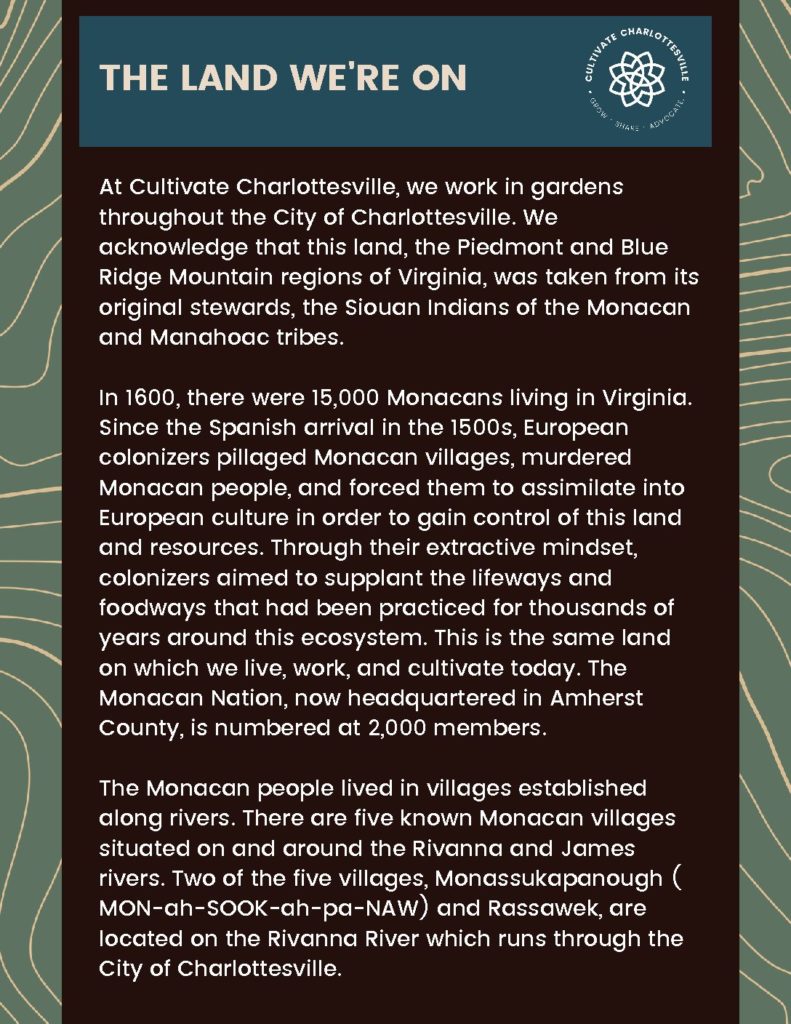
Each year the students grow hundreds of pounds of produce in the school garden. With the support of our mobile kitchens, CSG Garden Coordinators facilitate cooking activities where students harvest the food, clean, prepare and cook the food right in the garden. When the mobile kitchen isn’t in use, students are able to harvest and bag up the produce that they want to take home.
Starting in fall 2020, student-led focus groups and initiatives at CHS, Buford and Walker ensure that students are positioned to lead the conversation around what they want to see in their cafeteria. Cultivate Charlottesville facilitates these Student Nutrition Committee Meetings in collaboration with city school administrators. A five-year grant from the Charlottesville Area Community Foundation partners City Schoolyard Garden programs with Charlottesville City Schools Nutrition Department to increase fresh, from scratch, and healthy food options in our cafeterias, all led by student preference.
To celebrate Farm to School and Healthy Schools Week the first week in October, students experience a week-long menu of locally sourced food made from scratch. Cultivate Charlottesville coordinates with Charlottesville City Schools to connect students with local farmers through demonstrations, visits and taste-testing at their City Schoolyard Garden.
The Spring Seedling Project is a multi-faceted, youth-centered project that builds youth leadership and invests in neighborhood food security by engaging middle school students in planting, growing, and distributing seedlings to community organizations and Charlottesville City School (CCS) families and students.
Starting in February, hundreds of Buford Middle School students grow over 9,000 plants. Of those plants, 6,500 are distributed at no cost to schoolyard gardens, partner organizations, and students and their families including Urban Agriculture Collective Farms, IRC’s New Roots Program, Bread & Roses, City of Promise, Casa Alma, and Greenstone on 5th. The remaining 2,500 are distributed through the Spring Seedling Give-a-Way to the greater community.
Cultivate Charlottesville trains future leaders in food equity by mentoring Youth Food Justice Interns during summer months. For 8-weeks, interns spend 20 hours per week in the garden and in discussion groups learning about growing food, food access, food insecurity and food systems in Charlottesville.
Former interns have gone on to become active advocates in the food justice movement, through presentations to Charlottesville City Council, CCS school board, and the 2019’s Food System Conference in Savannah, GA. Former students have also joined the Cultivate Charlottesville staff, like Leon who you can read about on our staff page.
